YOUR BORN FREE SUPPORTER MAGAZINE
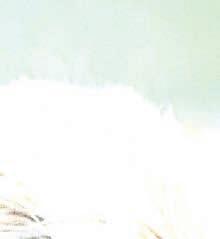


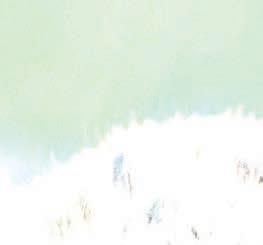


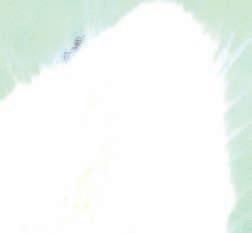
PATHWAYS TO FREEDOM: SHARE OUR 2030 VISION
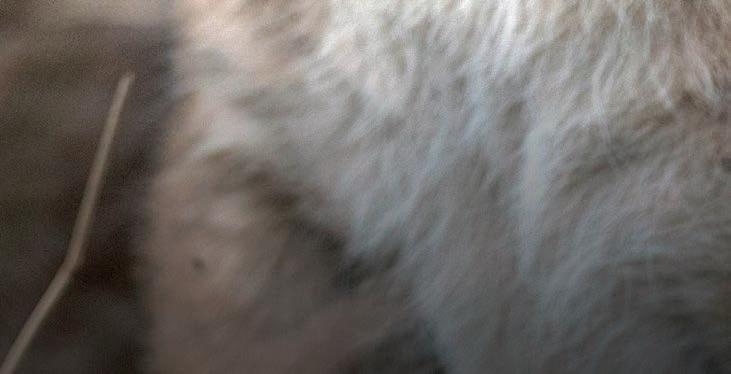
A FUTURE WHERE PEOPLE & WILDLIFE LIVE IN HARMONY
YOUR ROLE IN OUR FIVE-YEAR PLAN FOR A KINDER WORLD
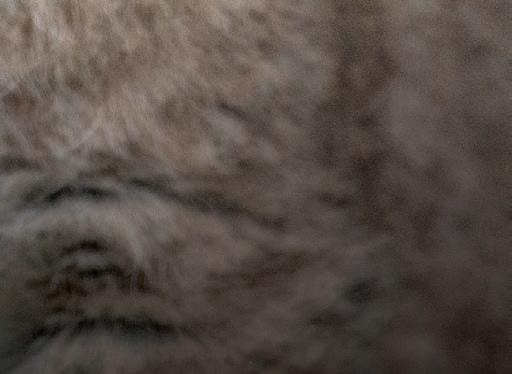
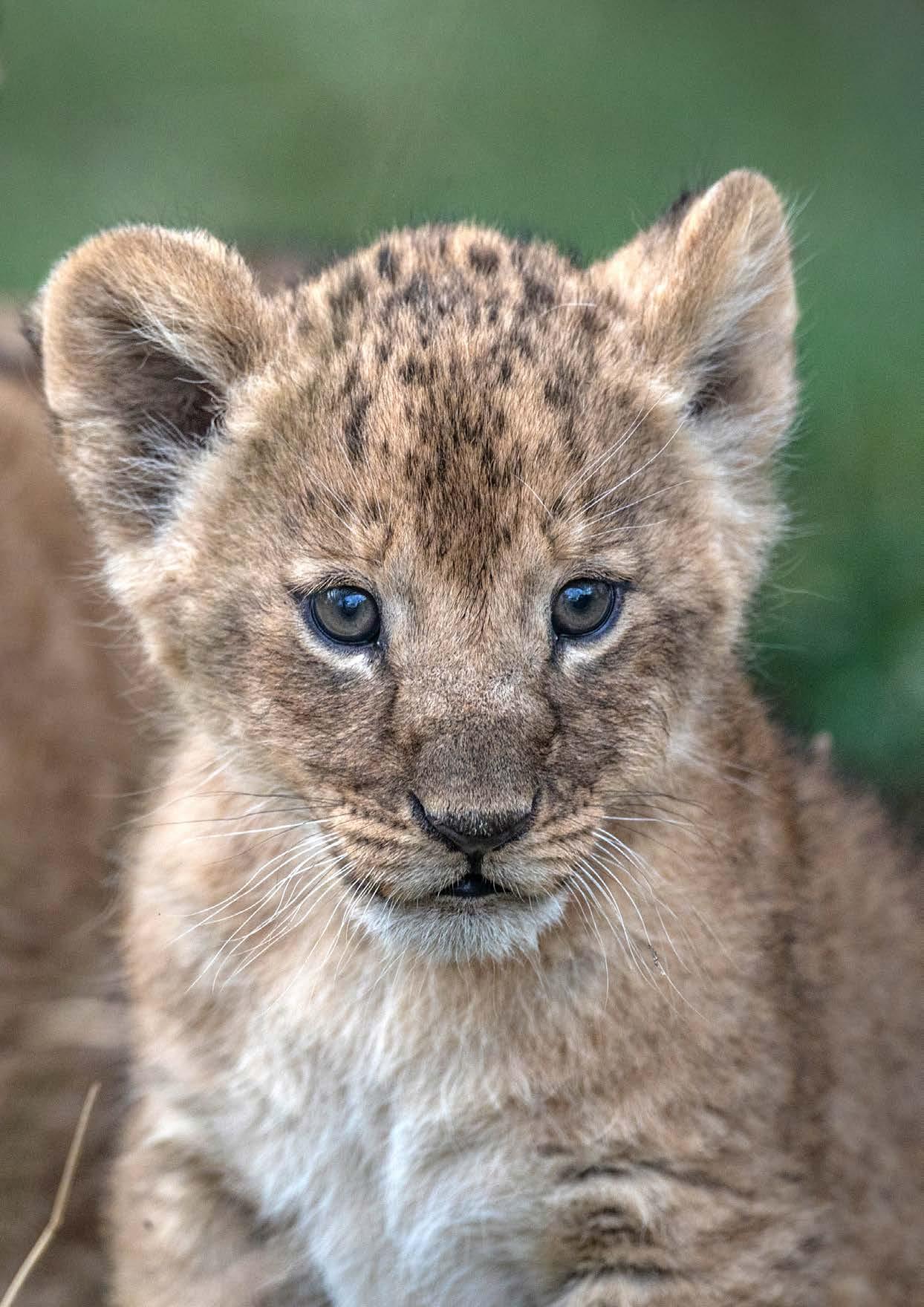

YOUR BORN FREE SUPPORTER MAGAZINE







PATHWAYS TO FREEDOM: SHARE OUR 2030 VISION

A FUTURE WHERE PEOPLE & WILDLIFE LIVE IN HARMONY
YOUR ROLE IN OUR FIVE-YEAR PLAN FOR A KINDER WORLD


Dear Family and Friends,
Born Free is just over 40 years young and, starting now in 2025, we’re implementing our new ‘Pathways to Freedom’ five-yearstrategy. We’re building on all we have already achieved. But looking to what greater impact we can have in the years ahead.
You can find out much more in this edition of Wild Life, focused on our twin strategic aims:
1.To end the exploitation, suffering and killing of wild animals
2.To protect wild animals and their habitats, so people and wildlife can coexist
We’re nothing if not ambitious! But, I’m full of hope and optimism. Not least because I know you, and everyone reading this magazine, share our values and our vision.
In 1984, a handful of us, including my late father Bill and my mother, Virginia, sat round our dining table. We pledged to do what we could, in our own small way, to change the world for good. Many said we were naive – and they were probably right!
But thinking of those far off, idealistic days, look how far we’ve come:
• UK dolphinariums – gone
• Wild animals in UK circuses – no more
• Wild lions, elephants and rhinos in Kenya, tigers in India –increasing in number
• The ivory trade – in retreat
• Thousands of people in marginalised communities – engaged and empowered
• A new generation – motivated and inspired
• Born Free’s voice – heard loud and clear at the highest level
And a network of supporters around the world – people like you – prepared to take less, do more, reach out, and champion what we stand for. If you don’t already, could you help bring our compassionate dream to life with a regular gift?
The Born Free Family is stronger than ever. Our vision is clear and compelling. And I for one, am amazed and proud of what we have done, where we are, and where we’re going! But always remember, as our Founder Patron, Dame Joanna Lumley, said recently: “We are Born Free. You are our Foundation.”

Will Travers OBE Executive President will@bornfree.org.uk @willtravers
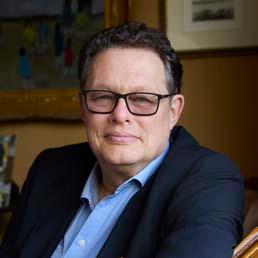
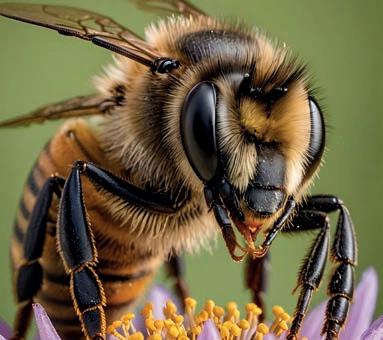

The next five years are critical for wild animals and the natural world. You can support our compassionate 2030 vision with a regular gift. You can save lives, stop suffering and challenge those who want to hunt, kill and exploit. See page 13 to find out more and visit bornfree.org.uk/donate.

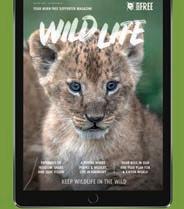
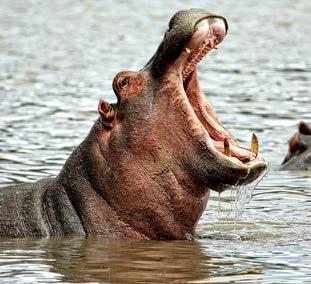
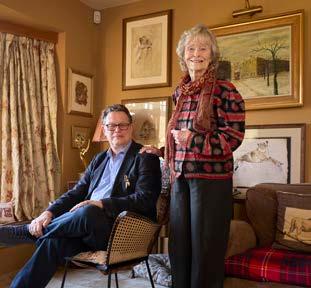




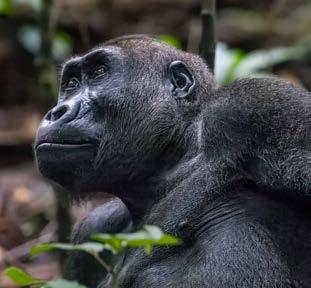


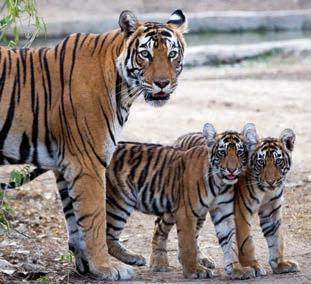

As you know, Born Free has a unique holistic approach to protecting wildlife. Equally devoted to wild animal care and conservation, we want to end exploitation AND keep rare species safe. But, how can we have the biggest impact?
With your help, our 2030 vision will focus on six iconic species or groups of animals. Well-known and widely loved, these wild heroes will ‘fly the flag’ for their habitats, so countless other species can thrive. But can you guess who they are?

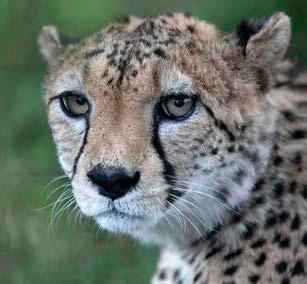

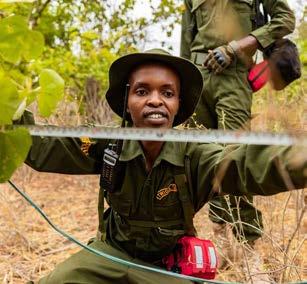

Born Free Foundation, 2nd Floor, Frazer House, 14 Carfax, Horsham, West Sussex, RH12 1ER, UK bornfree.org.uk | info@bornfree.org.uk +44 (0)1403 240170 bornfreefoundation bornfreefdn bornfreefoundation bornfreefoundation bornfreefoundation
The views expressed in Wild Life are not necessarily those of Born Free. If you have any comments or issues you would like to raise, please write to the Managing Editor.
Will Travers - Managing Editor: will@bornfree.org.uk Celia Nicholls - Editor: celia@bornfree.org.uk, Claire Stanford - Graphics & Brand Manager: claire@bornfree.org.uk Registered Charity No: 1070906



Great news. Three lion cubs have been spotted in our homeland of Meru, Kenya (page 25), born to six-year-old Amani, from the Bisanadi Pride. Just 23,000 wild lions remain across Africa, so every single new birth matters! We’ve helped Kenya Wildlife Service keep lions safe in this huge park, 220 miles NE of Nairobi, since 2014. “We’re so grateful for your support of this impactful conservation effort,” said Moses Nyagah, from our Pride of Meru team.


At last, after years of our campaigning, it’s illegal to sell ivory from hippos, narwhal, sperm whale and orca in the UK. Found in teeth and tusks, their ivory is now subject to the same trade restrictions as elephants. Thanks for being with us every step of our campaign!
Over 300 supporters enjoyed our starstudded gala evening at London’s Royal Lancaster in March. Hosted by Patrons Gaby Roslin and Nicky Campbell OBE, with special guests including Chris Packham CBE and artist Gary Hodges, the inspirational evening raised an extraordinary £260,000 for wildlife.
The many highlights included a performance by cast members from The Lion King, a rousing speech by Will Travers, and an unforgettable auction with James Lewis. But, perhaps most affecting was Founder Patron Dame Joanna Lumley, inspiring us all and reading a message from our Co-Founder, Dame Virginia McKenna, in her absence: “Footsteps to Freedom captures the very essence of what we strive to achieve at Born Free. Tonight represents a milestone on our journey of compassion, a journey that never ends.”

Leopard mum and daughter Ginny and Alda, and lion brothers Tsar and Jamil, all had a terrible start to life. But, with your help, we’ve been making it up to them. Enjoy new films of the four big cats (rescued from a Polish breeding centre and war-torn Ukraine respectively) thriving at our tranquil sanctuary in South Africa – visit bit.ly/alda-ginny and bit.ly/tsar-jamil
Chameleons mistreated. Monkeys sold online. Wild-caught parrots caged alone. We’ve been raising the alarm for decades. Millions of wild animals suffer due to the unfettered global ‘exotic pet’ trade. Now our new Don’t Pet Me campaign, with OneKind and SSPCA, is specifically calling on the Scottish government to take positive action to tackle this animal welfare crisis. We’ll report back!
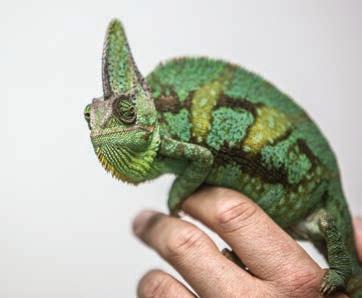
Quite frankly, you’re astonishing. Thanks to everyone who donated our Plight of the Pangolin appeal in February raised over £55,000 to protect and care for these gentle, mysterious animals. Meanwhile, our Green Match Fund in April raised more than £100,000 to help Save Africa’s Giants – elephants, giraffes, lions and more.
It’s definitely worth the wait! We’ve used beehive fences to help local people protect crops in Meru, Kenya, since 2023. Elephants are afraid of honeybees, so our fences help them live alongside people without conflict. But, that’s not all… “I’ve harvested 18kg of honey since my beehives were installed,” explains a delighted farmer, Alexander Mburung’a. What a bee-rilliant way to augment income and save elephants.
Can you sign our petition, and then ask your MP to protect hares from being shot when pregnant, or nursing their young? During their breeding season, these magical animals have no legal protection in England and Wales. Grotesquely, 300,000 or more are shot each year for ‘sport’. Appalled? To take action visit bornfree.org.uk/hares


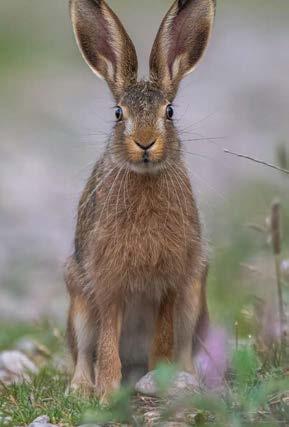
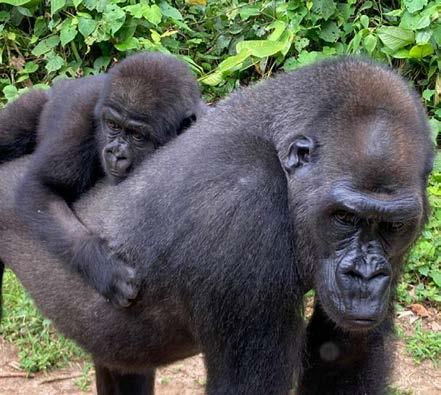
She’s only two, but Barbie’s already known a lifetime of suffering. Orphaned and shot in the head by bushmeat poachers in Cameroon, the fragile gorilla was taken in by our Ape Action Africa partners. Thankfully, she’s made a miraculous recovery at their Mefou Primate Sanctuary. And, as you can see, Barbie now has a very special friend – 16-year-old Luci, who’s been at Mefou since 2012.

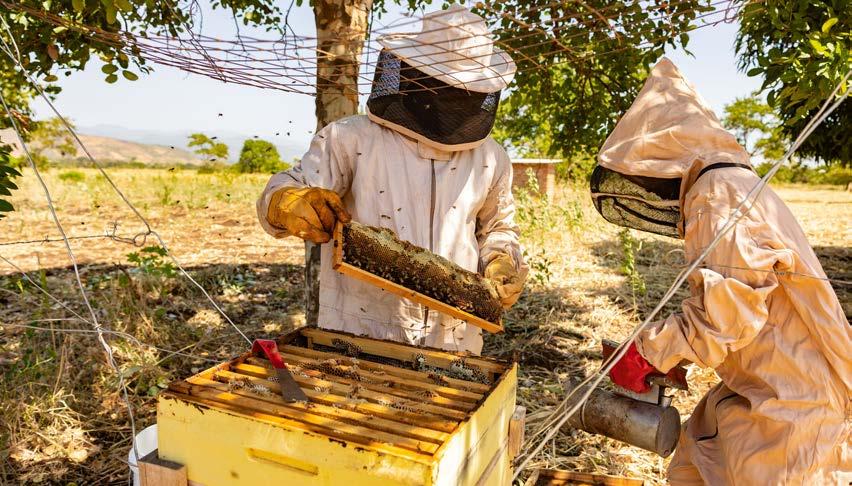

Our incredible 17-person London Marathon squad didn’t just complete the world’s most famous road race in April. They smashed their fundraising target and raised more than £44,000 for wildlife. We salute you!
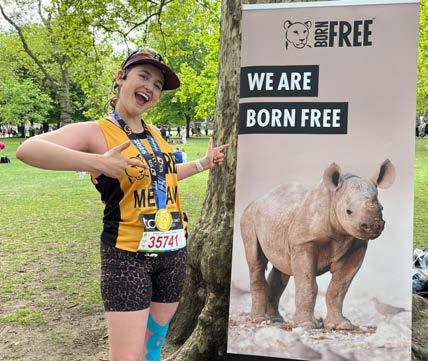
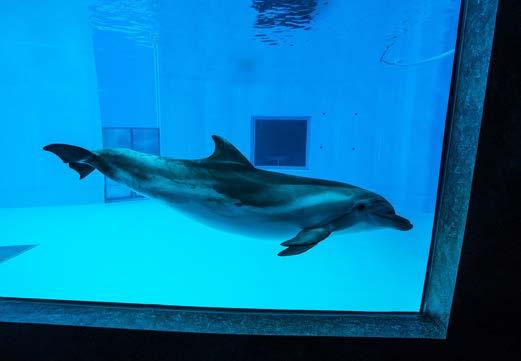
Can you spread the word? These intelligent, sentient beings don’t belong in concrete tanks or shallow sea pens. “Our new Tank Free campaign urges holidaymakers not to visit shows, pay to ‘swim-with’, or take selfies with captive dolphins,” explains Sarah Jefferson from our Policy team. “You can speak out against this cruelty and sign our Selfish Selfies’ pledge at bornfree. org.uk/tankfree.”
Keep an eye on our website – July’s a big month. Head of Policy, Dr Mark Jones, explains. “On Wednesday 2nd we’ll mark ten years since Cecil the lion was brutally killed by a trophy hunter in Zimbabwe. We’re planning a public event, with other groups, to help persuade the UK government to ban cruel trophy imports. Then, on Monday 14th, our major new report will expose just how badly great apes suffer in zoos.”
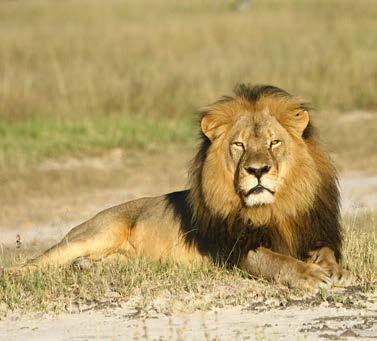
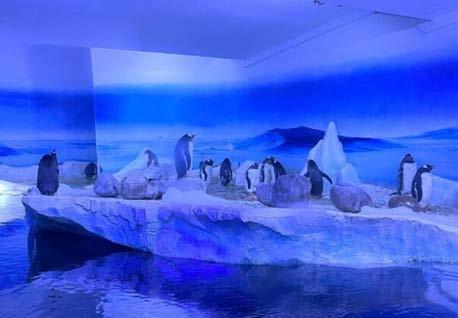
Please support our headline-hitting campaign to move 15 gentoo penguins, held underground at Sea Life London, to a better home. With no fresh air or natural light, their barren pool is just 7ft deep. Yet, in the wild, these 22mph swimmers explore their rich ocean environment at depths of up to 600ft. To sign our petition, visit bornfree.org.uk/ gentoo15
Born Free’s Tiger Webinar
International Tiger Day 29th July 2025
Online event
Celebrate 21 years of impactful tiger conservation. Hosted by Will Travers, this is a unique opportunity to hear from our remarkable colleagues in India and discover how you’re helping save the tiger.
Walk on the Wild Side
10th August 2025*
Anywhere in the world!
Could you walk or run 23,000 steps in a day, one pace for each of the 23,000 lions left in the wild?
*Or any chosen day in August
Footsteps to Freedom Ball
19th March 2026
Royal Lancaster London W2 2TY
Join Born Free, our Patrons and friends for a glorious evening of extraordinary stories, lifechanging projects, fine food and wine, dancing and entertainment at our black-tie ball.
Find out more at bornfree.org.uk/events
Have you signed up yet? Each month our Wild Voice email is full of wild news, animal stories and action – visit bornfree.org. uk/subscribe. We create an awesome monthly kids’ email too – bornfree.org. uk/kids-club. Finally, with fun facts and quizzes, our colourful primary school mag will inspire your wild child’s entire class! Ask their teacher to visit bornfree.org.uk/uk-education/hear-theroar-magazine
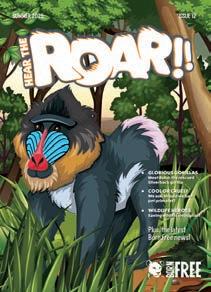

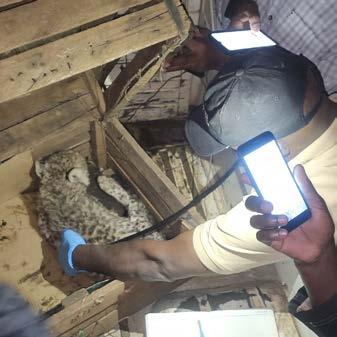

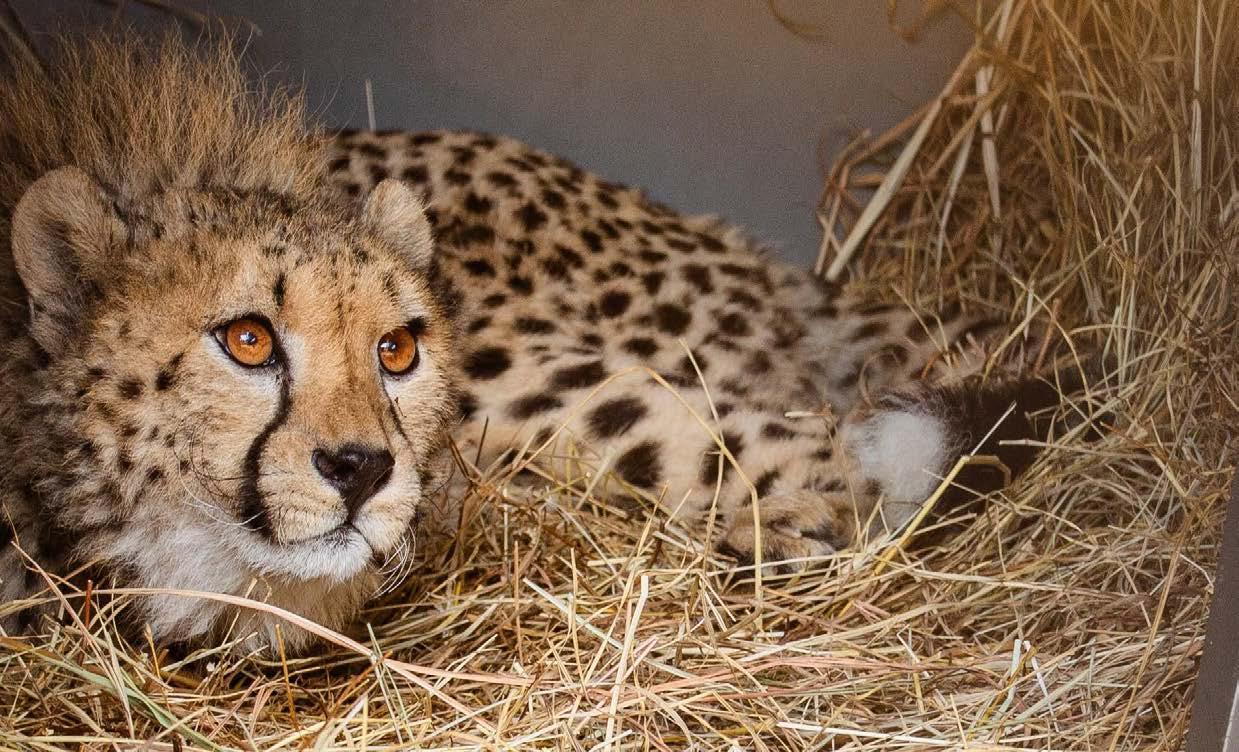
Last year, we told you the sad story of Blue, who received life-threatening injuries in a horrific car accident which killed her sister. We launched an appeal to Save Cheetahs this Christmas, and you responded immediately!
You donated over £50,000 to look after rescued cheetahs at our sanctuary in Ethiopia. But, how are we spending this money and, specifically, how is Blue? We spoke to our Head of Rescue & Care Maggie Balaskas.
“It means everything to know how much you care. Our wonderful Ethiopian Country Director, Bereket Girma, tells me Blue is progressing well and has been given access to more space in her hospital enclosure – which she clearly loves. But, her road to recovery has been complicated.
“Very sadly, despite our best possible care – including nutritious food and vitamins – little Blue broke her leg a few weeks ago. It’s heartbreaking how fragile these orphans are… thankfully she’s healing well. With the help of special supplements and our new x-ray machine (both of which you helped fund!), we can check her bone density, which is gradually improving.”
Learn more about Blue’s rescue journey with our new short film: bornfree.org.uk/news/ blue-recovery
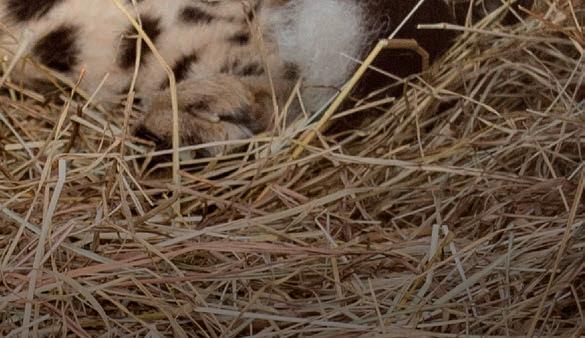

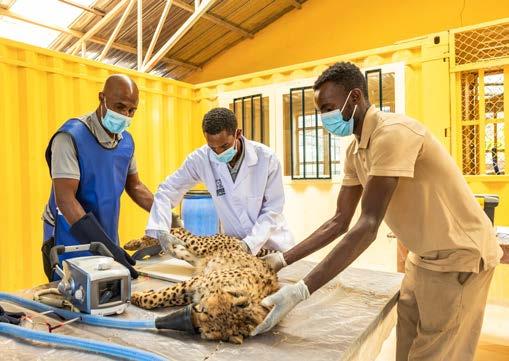
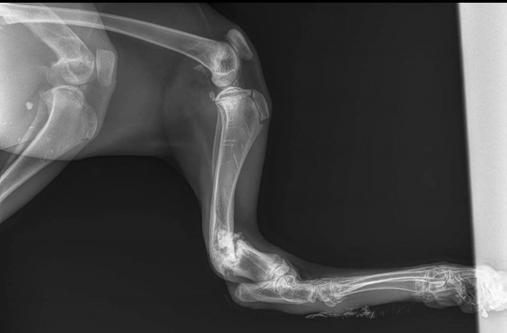
Blue’s x-ray shows good progress, but her bone density still has a long way to go. With your help we’ll keep doing all we can to aid her journey to recovery
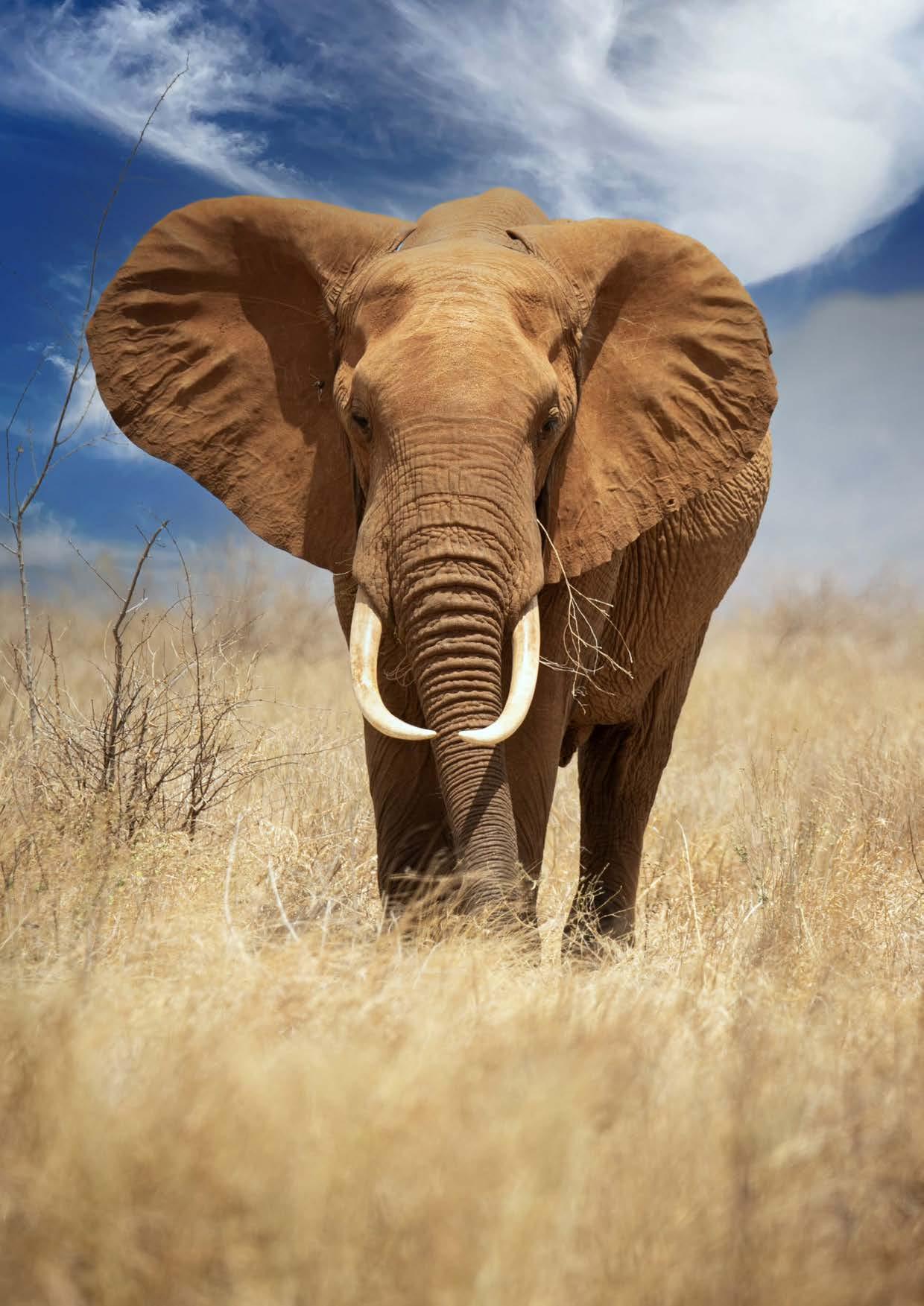
“With a vision of thriving wildlife populations, living wild and free, our five-year-strategy offers three things: compassion, action, and hope.”

Will Travers chats with his mother, Dame Virginia McKenna, about their 2030 vision for our charity, and their hopes for a world where people and wildlife live in harmony.


Will: What’s at the heart of our work, would you say, Virginia?



Virginia: At Born Free, it all starts with one. One animal needing rescue, one species to save, one habitat to protect, one planet to nurture. And of course, the power resides in each one of us to do something to help. Which is why I always say to supporters –please, stand with us and YOU can be the one.


Will: What does ‘Keep Wildlife in the Wild’ mean to you?
Virginia: Like so many of the best ideas, ours is simple. That the wildlife we share this planet with, belongs in the wild. This is the place wild animals have evolved to be. That means, whether the journey is fast or slow, our progress is measured by what we can do to end the incarceration of wild animals in zoos, circuses, or held as exotic ‘pets’.
Our efforts to end the brutal wildlife trade, or the horrors of trophy hunting, must be steadfast and relentless. Our impact must demonstrate that wild species and wild habitats are safe, and have a future – as do the people who share those habitats.
Virginia: How about you Will, how do you stay motivated?
Will: The world has always been divided into those who have, and those who have not. I don’t think it’s getting better. In fact, it seems to be getting worse. I find it extraordinary we have individual
people with such extraordinary personal wealth they can spend billions pursuing their ambition to travel to Mars.
While for hundreds of millions of other people, their daily ambition is to have clean water, secure food, education for their children, and a roof over their heads. Of course, there are those who believe the best way to drag the poorest out of abject poverty is not to better share what we have, but to exploit nature more, not less.
What would dad have said our priorities should be?
Virginia: Bill* always believed in respect for all living creatures. To reject self-obsession, and look after the nonhuman species with whom we share the planet. And to understand that, when we truly believe in something, we should never give up, never give in.
Our dreams should be limitless. My personal nightmare? That future generations will only catch a glimpse of the glory of nature when they see an animal in a cage, or a trophy on a wall.
Virginia: Why is our new strategy important?
Will: Our world is bewilderingly complex. A million pieces of information – some true, many false – vie for our attention. It seems to me that we’ve never been so connected, and yet never so disconnected. We need to reconnect with the truth, and it starts with our vision, our Born Free 2030 vision.
That’s why all the hard work that has gone into developing our new five-yearstrategy is so very important. That is the standard around which we rally, around which we build our narrative, around which we gather to tell stories, share images, and be inspired.
Virginia: Above all, I believe our five-year-strategy – built around coexistence, where thriving wildlife populations live wild and free, alongside resilient human communities – offers three things: compassion, action, and hope.
*Bill Travers MBE, Born Free’s Co-Founder



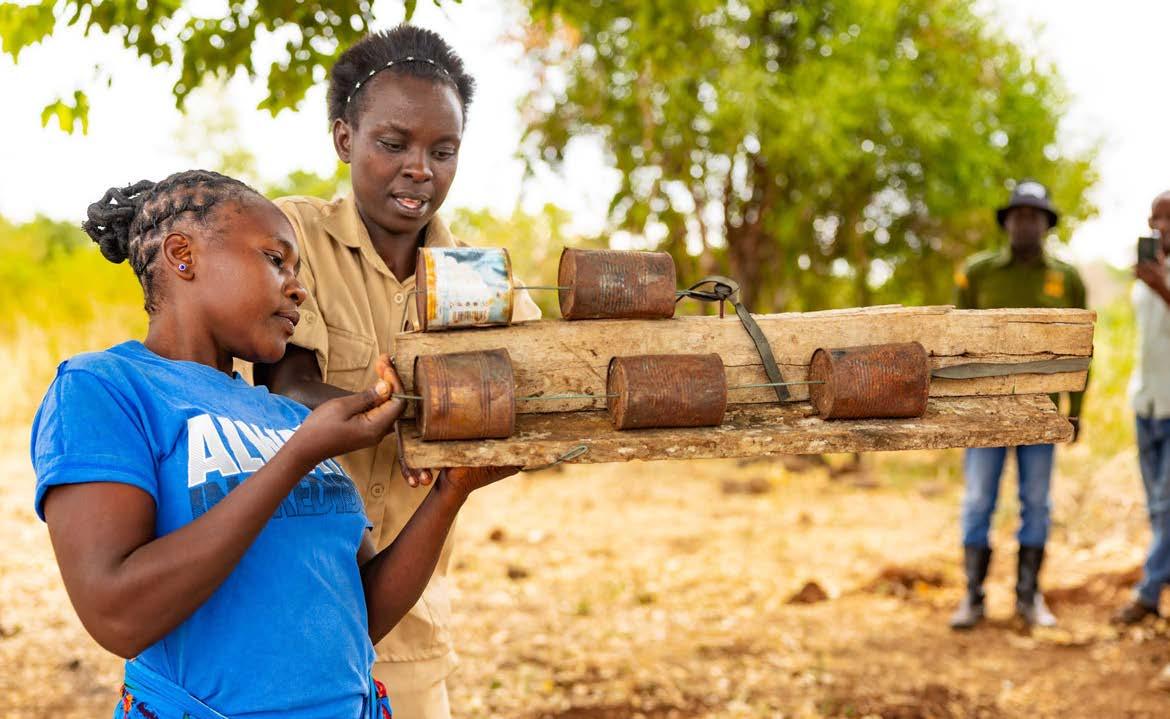

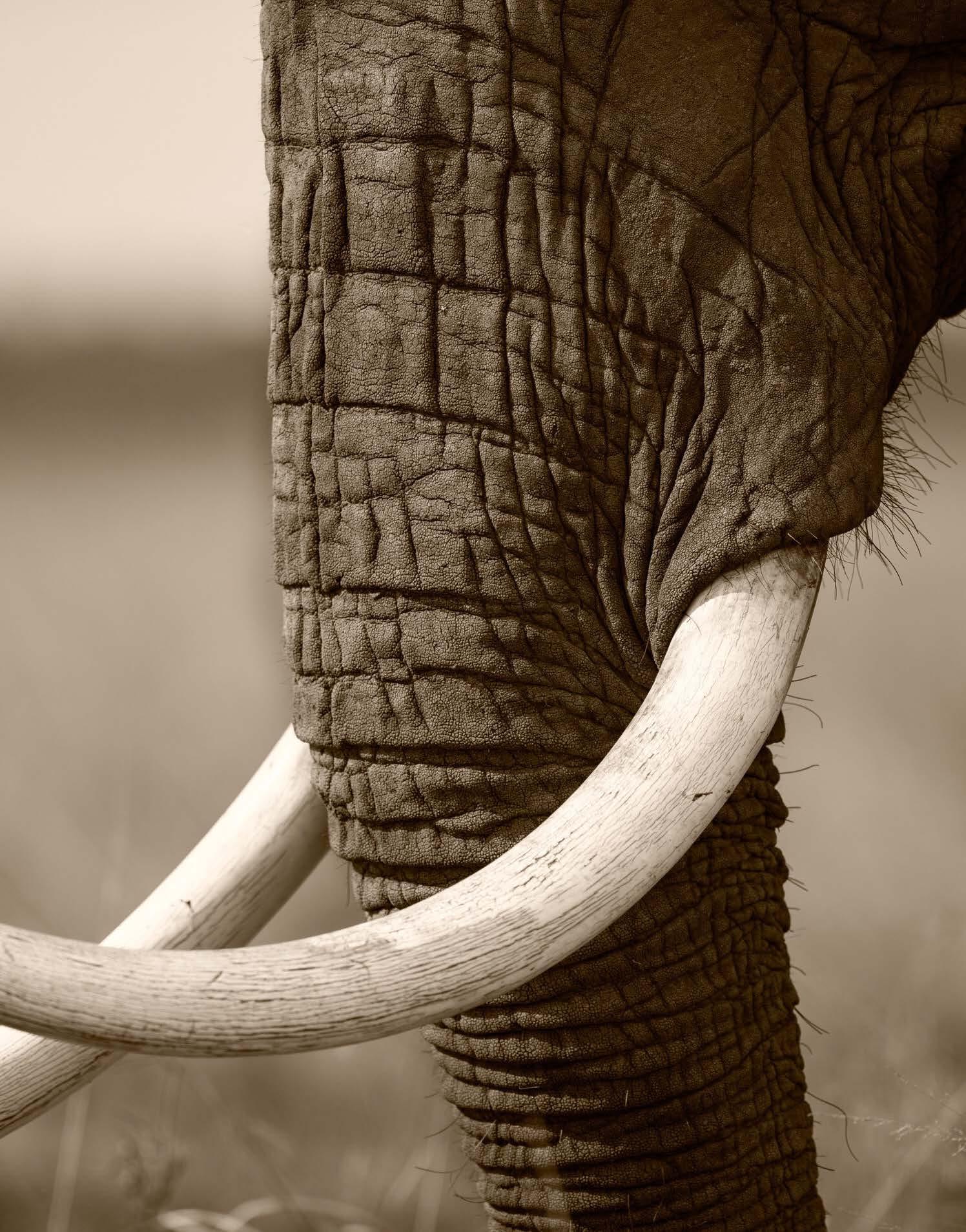
Did you know progressive policy underpins everything we do at Born Free? Dr Mark Jones explains how we influence wild animal-friendly legal protections worldwide.
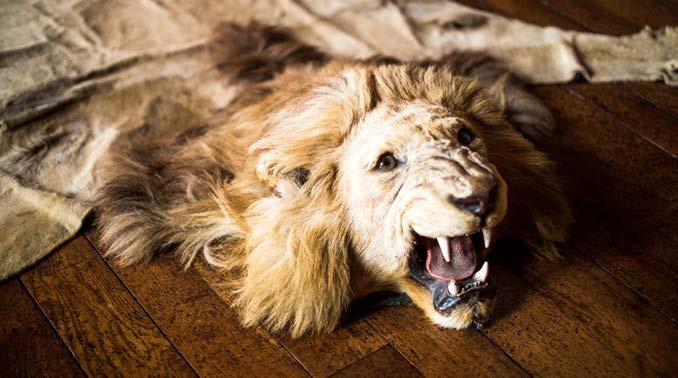
Throughout our 41-year history, Born Free has directly helped protect countless wild animals under threat, and their habitats. We’ve reduced conflicts between local communities and wildlife, and transformed the lives of so many wild animals –rescued from dire situations.
These efforts wouldn’t be possible without the unwavering backing of you, our valued supporters. However, we can’t achieve our vision of a world where individual wild animals are treated with respect and compassion, unless we persuade those in authority to act.
As a vet, I’m passionate about wildlife and share your passion to protect nature and end cruel exploitation. As Born Free’s Head of Policy, I’m honoured to work with a dedicated team of hard-working, like-minded people who’ll go the extra mile.
We’ve set out ambitious targets to guide our efforts for the next five years. With your help, we’ll do everything we can to meet these targets and, by doing so, achieve even greater protection for nature and wild animals.
To that end, our Policy work – trying to ensure protecting wildlife and the welfare of wild animals is prioritised at every level – is critically important. We aim to influence decisionmaking at important and influential international forums such as the United Nations and the World Conservation Congress, as well as
at regional, national and local levels of government.
Wild animal friendly legislation and policy not only uses the rule of law to protect wildlife, it also creates the framework within which we can engage more effectively with communities to protect wildlife in the field, and rescue and care for animals in need.
Over the years, Born Free’s efforts have helped achieve many wins for wildlife. These include:
1. Securing the ban on international trade in elephant ivory in 1989 and a domestic ban in the UK in 2022 –extended to hippo and whale ivory in 2025.
2. The historic ‘Kunming-Montreal Global Biodiversity Framework’, agreed by world governments in 2022, has clear targets to halt wildlife destruction by 2030.
3. Helping kick off a process leading – we hope – to regional and global agreements on tackling wildlife crime.
4. Helping secure the closure of the UK’s last dolphinarium back in 1993, and the UK ban on wild animals in circuses in 2020.
5. Helping secure the inclusion of ‘animal cruelty content’ in the UK’s Online Safety Act in 2024.
These and countless other policy achievements help underpin everything we do at Born Free. Through our advocacy efforts, our Policy team has become well-known and respected the world over.
How do we measure our impact? Our long-term approach has several phases:
Change awareness and opinions among policymakers.
Change the dialogue and language used at policy forums.
Ensure relevant agendas include wildlife protection.
Introduce or improve wildlife-friendly legislation and policy wherever possible.
Effectively implement wildlife and animal welfare law and policy.
Demonstrate the benefits of our achievements for wildlife, so they can be reinforced and repeated.
“Born Free plays a critical role supporting UK’s National Wildlife Crime Unit and helping ensure enforcement remains a priority in the UK. Your commitment to conservation and animal welfare enhances the effectiveness of our efforts, through collaboration and advice-sharing.
“We strongly support Born Free’s work as an essential partner in the fight against wildlife crime. You strengthen our impact and societal understanding of why enforcement is vital to protect our natural heritage. I’d like to thank your hard-working team and supporters.”
Chief Inspector Kevin Lacks-Kelly Head of the UK’s National Wildlife Crime Unit

However, there is much more to do. Our ultimate aim is to end the exploitation and suffering of wild animals, and protect wild animals and their habitats. How do we do this? Our key priorities include:
1. Ending wildlife crime
We need to ensure crimes such as poaching and trafficking are treated seriously the world over. Resources must be put in place to tackle this multi-billion-pound criminal industry.
Long term, we seek a legally-binding global agreement putting wildlife crime on a par with drugs and arms trafficking. Short term, we’re demanding the UK government funds the National Wildlife Crime Unit’s vital work, and that police and judicial systems take such crimes seriously.
2. Phasing-out key animals in zoos
Our long-term vision is a world without zoos, where animals are no longer exploited for entertainment and profit. In the short term, we will continue to provide evidence to the UK and other jurisdictions to show why certain species are especially unsuited to life in captivity.
This includes phasing-out the incarceration of great apes, elephants, big cats, giraffes and polar bears.
3. Ending trophy hunting
We have long campaigned for an end to the heinous practice of trophy hunting. In the short term, we’re urging the UK government to make good on its manifesto pledge to end the importation of wildlife trophies into the UK (then Europe, then the world!).
But, we can’t do all this work for wildlife alone. So, our Policy team collaborates with many other likeminded organisations and expert individuals. But you, our supporters, also have a vital role to play.
You not only help fund our vital work. You also help us get the message to policymakers that you’re fully behind our efforts to protect wild animals, and ensure they can thrive – where they belong – in the wild.
Dr Mark Jones Head of Policy & Veterinarian markj@bornfree.org.uk
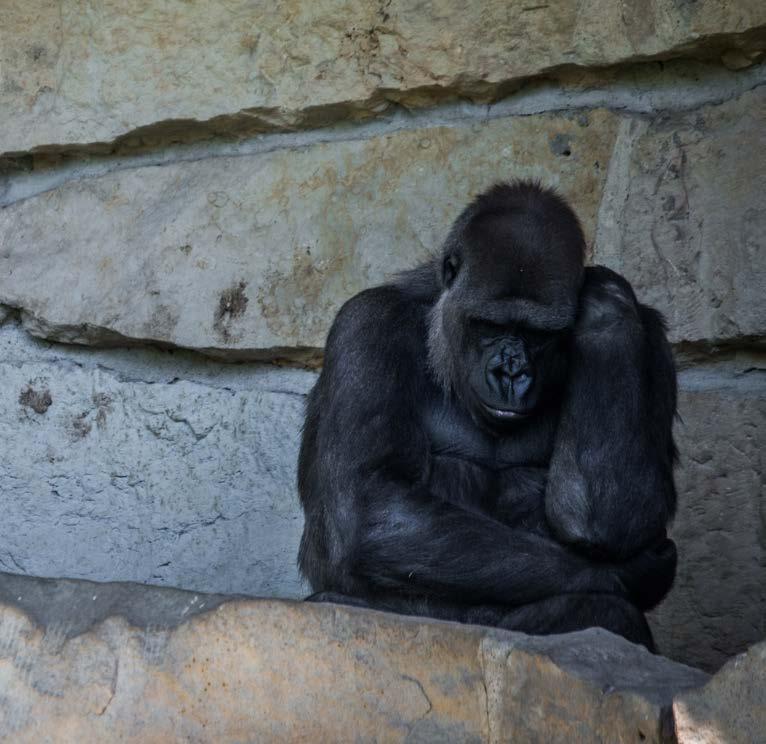
We want to:
Halt and reverse the global decline in wildlife by 2030
Protect wildlife against international trade
Tackle global, national, and local wildlife crime
End exploitation that puts animals and people at risk of injury and disease
End animal suffering in zoos and at tourist sites
Regulate wild animal pet trade to prioritise welfare and protection
End trophy hunting.
Ensure national governments implement the Global Biodiversity Framework
Reform UK and EU zoo licensing, securing the phasing-out of ‘unsuitable animals’
Restrict UK wild animal pet trade to species ‘whose welfare can be fully provided for’
Prohibit UK and EU hunting trophy imports
Ban UK sale of ‘low welfare tourism activities abroad’.




The next five years are critical for wild animals and the natural world. The climate crisis, so closely connected to the biodiversity crisis, threatens the survival of life on earth – including ours. Countless individual wild animals are exploited, while species and their habitats are threatened.

Since Born Free began in 1984, we’ve taken effective frontline action for wild animals. This is thanks to your help. Bold and ambitious, we speak out for wild animals, a trusted voice challenging their exploitation in captivity, and championing their compassionate conservation in the wild.
Our work has had an enormous impact on millions of animals, reaching many different species and countries. But, we need to do so much more. Too many animals suffer for human entertainment, are traded for profit, or are threatened as the natural world retreats – faced by a wave of humanity.
I hope you enjoy reading about our ambitious plans in this magazine. Our new Pathways to Freedom strategy 2025-2030 advances our vision of a world where wildlife and people coexist. It draws on over 40 years’ experience, standing up for wild animals, their habitats, and local communities. Working with those who, like you, share our values.
As we continue our journey together, I have a special request. Please, can you secure our vision with a regular
donation? Your monthly gift would help us plan long into the future. And, of course, you can still change the value of your gift at any time.
Many Born Free supporters kindly already contribute a regular gift. Each one makes a big difference – I can’t thank you enough, on behalf of the animals.
But, if you’ve not done so yet, or you want to increase your monthly donation, this is your chance to be part of our long-term plans. In return, the Born Free team will do everything in their power to deliver a better world!
Your gift will:
1. Fight exploitation and stop suffering
2. Influence wild-animal friendly policy
3. Rescue and care for individual animals
4. Engage communities to protect species and their habitats
Every time you hear about our work, you’ll have the satisfaction of knowing that you played a vital part in our success!
I really look forward to updating you. With my personal good wishes and renewed thanks.

Will Travers OBE Executive President and Co-Founder

We’ve always called for the phasing-out of zoos, but what happens to the animals when they close down? Chris Lewis explains our practical approach.
Recently, Born Free has celebrated several successes when it comes to exploitative facilities closing their doors: South Lakes Zoo, Cumbria and Marineland Antibes, France, to name just two. However, celebration comes with justifiable concern as to the fate of the animals at such establishments.
If a zoo voluntarily closes within the UK, the animals remain the responsibility of the zoo. In contrast, if a facility is closed by a licensing authority, that authority may seize control of any animals. Depending on these circumstances, it may limit Born Free’s direct involvement. However, we’ll always attempt to ensure the welfare of the animals remains paramount.
As you can imagine, zoos closing can put innocent wild animals in a perilous position, which is why Born Free continues to call on MPs to introduce a Zoo Insurance Bond*. All zoos should pay into a fund to ensure the care and welfare of animals if a zoo closes, until new homes can be found.
Turn zoos into sanctuaries!

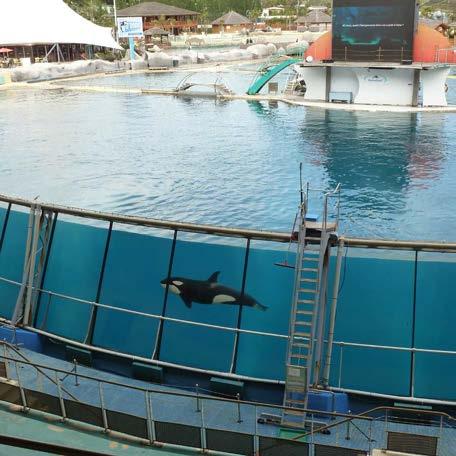
While some facilities close altogether, it’s also possible for zoos to transform into much needed sanctuaries. In 2007, Born Free helped found Lilongwe Wildlife Centre by reforming a former zoo into Malawi’s only wildlife sanctuary – which now offers a lifeline to wild animals in distress, not least pangolins. Limbe Wildlife Centre in Cameroon is another example, an ex-zoo, now expertly rescuing gorillas, chimps and more.
Thankfully, an increasing number of captive animal facilities are transforming into more ethical and humane establishments, putting animal welfare first. But, sadly, these remain in the minority. As we approach 2030, we will continue to push for improved, stringent zoo licensing and standards, alongside commitments to phase-out species particularly unsuited to life in zoos (eg giraffes, apes etc), as we strive for a world where wild animals are no longer exploited in captivity.

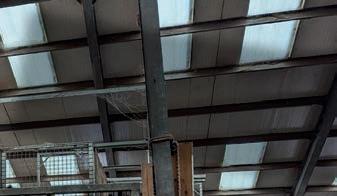


Zoos vs sanctuaries – what’s the difference?
True sanctuaries:
Rescue animals in need –injured or orphaned in the wild, exploited in captivity, or confiscated from illegal trade
Rehabilitate animals back to the wild or provide world-class lifetime care
Always put animal wellbeing first, with enclosures designed for privacy
Have a no-breeding policy
Don’t buy, sell, trade, or display animals



Any visitors are strictly limited, with no direct contact and always escorted.
Chris Lewis Captivity Research & Policy Manager clewis@bornfree.org.uk
Discover how you can help at bornfree.org.uk/raise-the-red-flag/

Our life-changing Raise the Red Flag campaign asks you to report suffering and take action to help end exploitation. Sarah Jefferson explains your vital role.
In 2000, we launched a new campaign harnessing ‘people power’ to target the exploitation of captive wild animals around the world. Our Raise the Red Flag platform (previously Travellers’ Animal Alert) has developed extensively over the last 25 years.
We encourage everyone, whether in their home country or travelling abroad, to look out for captive wild animals and report suffering. From elephants repeatedly pacing, to lion cubs clutched for tourist photos, our dedicated online Red Flag platform has gathered nearly 18,000 eyewitness reports, plus hundreds of thousands of photos and videos.
These reports, from people like you, provide key evidence enabling Born Free to:
1. Raise vital awareness not least global press articles
2. Conduct further investigations wherever possible
3. Lobby decision-makers to make positive change
4. Persuade holiday companies to boycott exploitation
5. Enhance our ongoing campaigns to help captive wild animals
Red Flag reports have led to animals being rescued and rehomed, such as:
• Sandro the tiger, rescued from a terrible zoo in Spain (now closed), who now enjoys life at our partner sanctuary, Animanatura, in Italy.
• Simao the wild-caught orphan chimp, sold as a pet in Guinea Bissau then kept in a tiny cage. Now happy at a sanctuary in Liberia.
Captive animals have even been returned to the wild thanks to your reports, including:
• Dolphins Misha and Tom, rescued from a dirty pool in Turkey (where tourists paid to swim with them), then rehabilitated back to the ocean.
• Loggerhead turtles Genoveffa and Gavino, rescued from an appalling aquarium tank, then rehabilitated and released off the coast of Sardinia.
Sadly, it’s not always possible to rescue animals in need. But, your reports and speaking out are key. You can ensure their plight is brought to the attention of those with power to take direct action. For a start, making sure neglected animals have drinking water, enrichment or improved living

conditions might not seem much, but could be life changing.
By 2030, we want an end to the most exploitative activities and low welfare conditions. As for those facilities, companies, or countries seemingly intent on not making compassionate changes, we need everyone to continue to speak out, to make them listen, and to encourage positive change. Thank you!
Sarah Jefferson Captivity Campaigns Information Coordinator sarahj@bornfree.org.uk
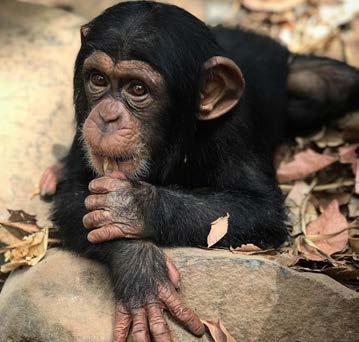


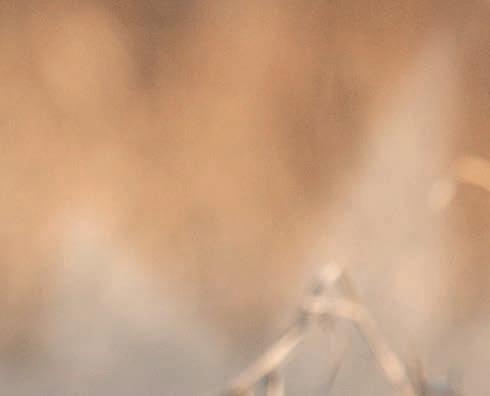
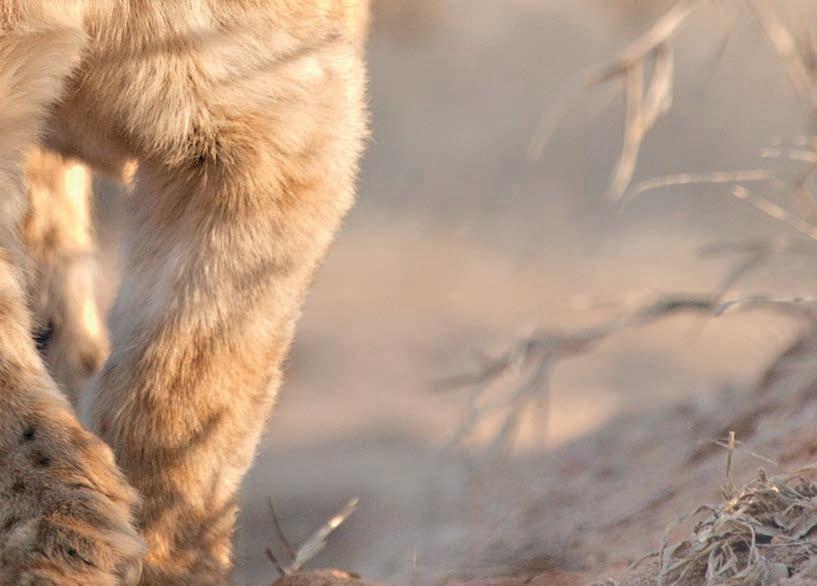


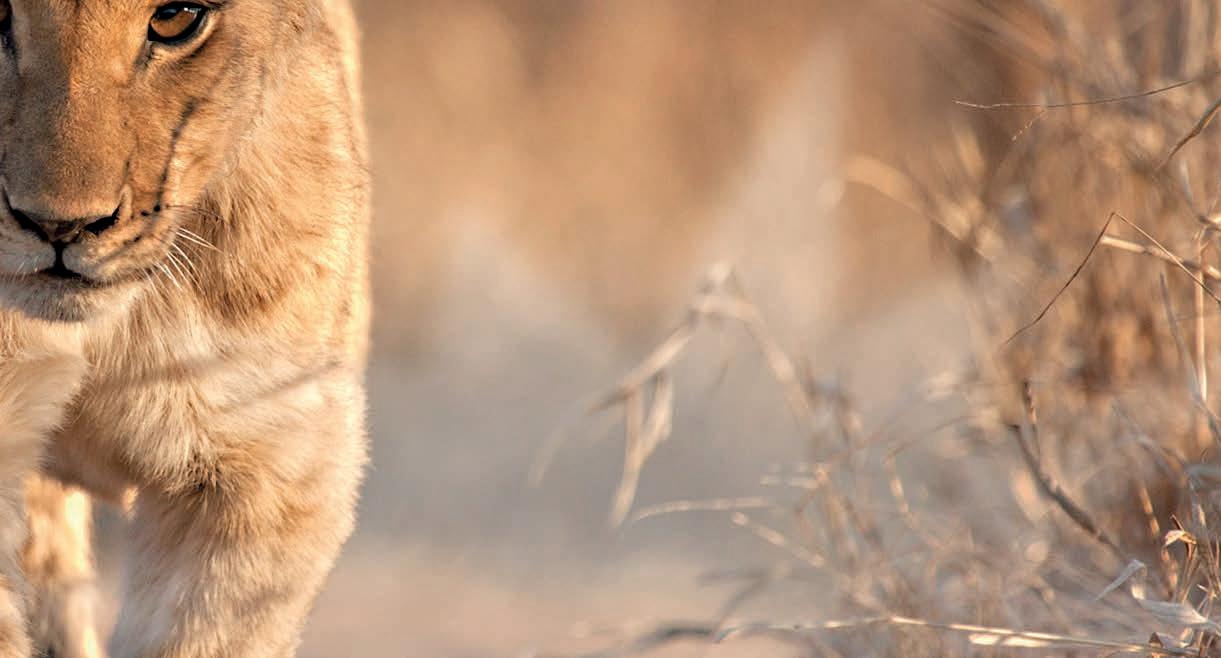

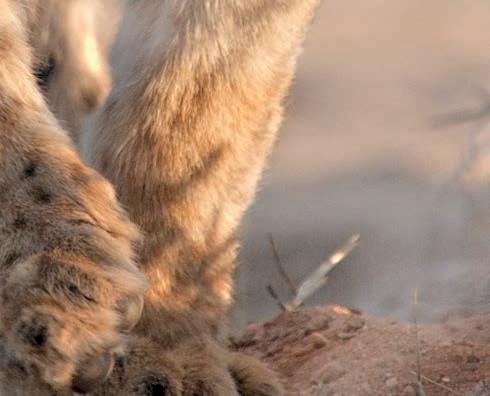




Do you ever get perplexed by everything we do at Born Free? Do you love conservation, but aren’t sure what the ‘zoo thing’ is all about? Enraged by cruelty, but uncertain how our ‘Keep Wildlife in the Wild’ slogan ties in?
Welcome to the dazzling, yet complex, world of Born Free!
If you get confused by the breadth of our work, try taking a moment and ‘remember the animals’. Hold each one in your heart. Think where they’re meant to be. Suddenly, everything makes sense.
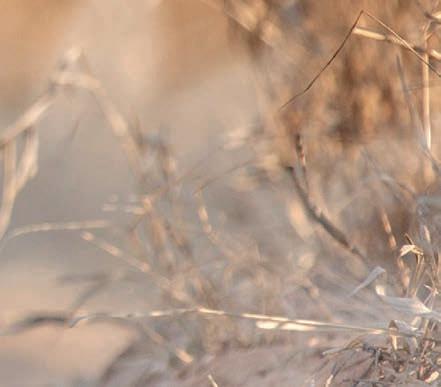

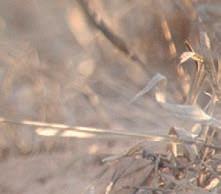

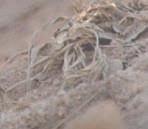
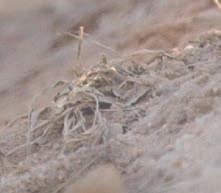

To smash our 2030 mission to end exploitation and protect wildlife, with your help we’ll focus on several iconic species. Say hello to the six superstars, says Celia Nicholls.

Take elephants. Majestic, most sensitive of species. Sublime family animals – self-aware and wise. Beautiful, ancient beings, who evolved over 60 million years to roam savannahwoodlands and forests. Known as ‘super-keystone’ animals, they’re the gentle architects holding entire ecosystems together, so countless other species flourish.
Yet, we steal their babies and condemn them to a miserable lifetime of concrete and bars. We chain them, train through fear and aggression to perform
degrading tricks in a circus ring, or carry misguided tourists. We kill them and hack off their tusks so people can sell ivory trinkets. Or pay a huge sum to shoot them ‘for fun’.
This is why we do what we do at Born Free. It’s not enough ‘just’ to keep elephants safe in the wild. Loving them as we do, we have to fight their exploitation as well. We won’t stop until they are safe, and the happiness of each one matters.




Why every animal counts
I was lucky enough to spend a few days with Dame Daphne Sheldrick, the world famous ‘Elephant Mother’, who sadly died in 2018. Daphne ran an elephant orphanage* near Nairobi, Kenya, and back in the early 90s was speaking at an ivory conference, in Berlin.
We shared a hotel room and navigated the bustling, bewildered city – learning to be whole, just a year or so after the wall came down. Daphne told me every species she’d ever cared for, from a rhino to an antelope, had emotional states. Each soul unique. Like us.
No surprise to anyone lucky enough to have loved (and lost) a precious pet cat or dog. But, 30+ years ago and as a zoologist, I knew this was trail-blazing for wild animals.
Holding out for a hero
I digress. Back to our six superstars! This magazine is devoted to Born Free’s 2030 vision. To maximise our impact over the next five years, our strategy will focus on six key primary species, or groups of animals. While, of course, never forgetting the individual.
These figurehead species will be ambassadors, helping represent their habitats. By concentrating on these flagship or hero animals, Born Free can transform wildlife well-being and protection. Well known and widely lovely, these priority species will fly the flag for:
•A multitude of other animals, exploited and suffering in captivity
•Their own natural ecosystems, home to a myriad other species. But, who are these heroes? Drumroll!
Big cats – lions, tigers, leopards and cheetahs
Elephants – both African and Asian Giraffes
Rhinos in Africa – white and black
Primates – not least great apes
Pangolins– both African and Asian
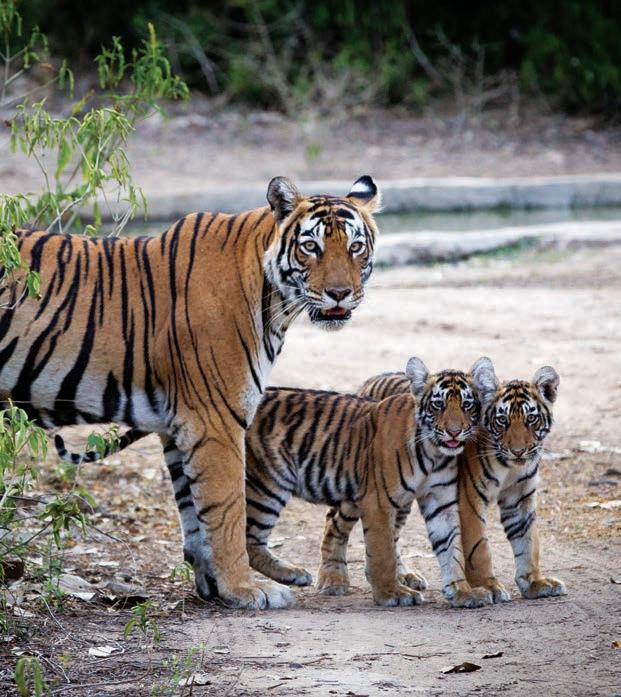
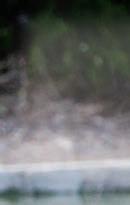
Free will: 1. 1.

Campaign to end exploitation in zoos and circuses, and the exotic pet trade.
Rescue animals from captivity or confiscated from illegal trade, and provide lifetime care in world-class sanctuaries.
Campaign to end trophy hunting and big cat-related trade, including live cheetah cubs and lion bones.
Develop sustainable, effective ways to reduce conflict between predators and communities.
Undertake long-term monitoring and conservation in the wild, including lions in Meru, Kenya.
Support landscape-scale conservation of tigers in India through our partnership with local organisations.
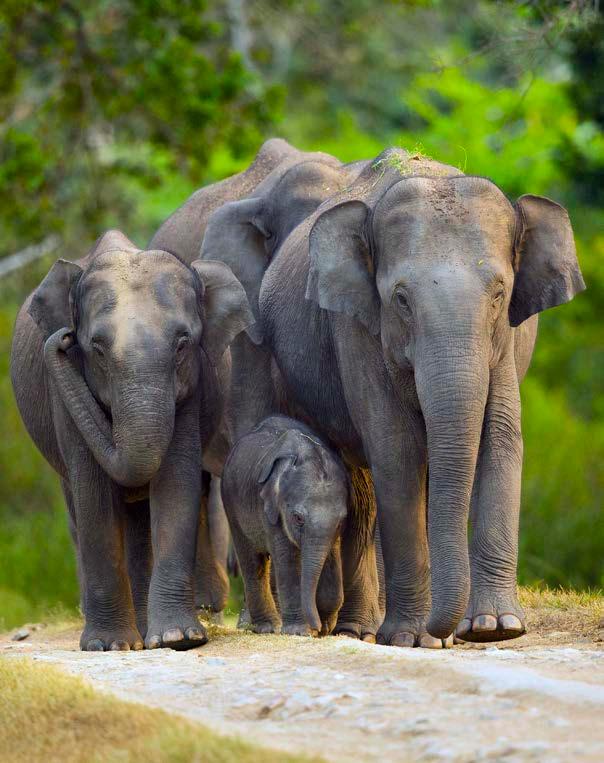
2. 2. 3. 3. Are withyouus? Are withyouus? The animals need you! The animals need you!
Born Free will:
Campaign to end exploitation in zoos and circuses.
Fight the brutal trade in ivory and wild-caught calves.
Develop, implement, and share innovative ways to reduce conflict between elephants and people.
Support and undertake long-term monitoring and conservation in the wild.

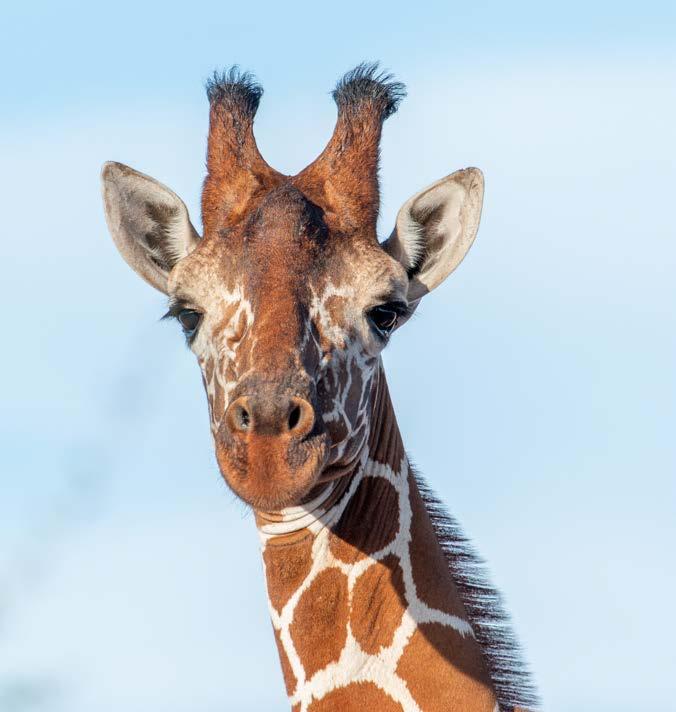

Support the creation of ‘Pangea’, the first large-scale elephant sanctuary in Europe. 3. 3.



Born Free will:



Campaign to end exploitation in zoos and circuses.

Campaign to end trophy hunting, and trade in giraffe parts.
Undertake long-term monitoring and conservation in the wild.
Protect giraffe from snares, poaching, and the bushmeat trade.
Promote peaceful coexistence with people.


Born Free will:
Campaign to end exploitation in zoos and circuses.
Help protect critical populations of African rhinos.
Provide equipment and direct support to keep black and white rhinos safe from poaching in Kenya’s Meru Rhino Sanctuary.
Undertake anti-poaching patrols, removing snares, in partnership with Kenya Wildlife Service.









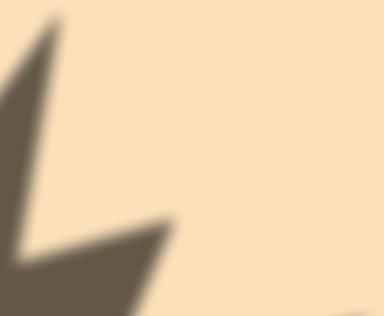
Campaign against the trade in rhino horn and live animals.

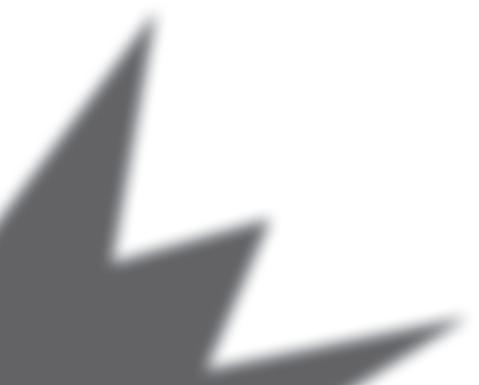
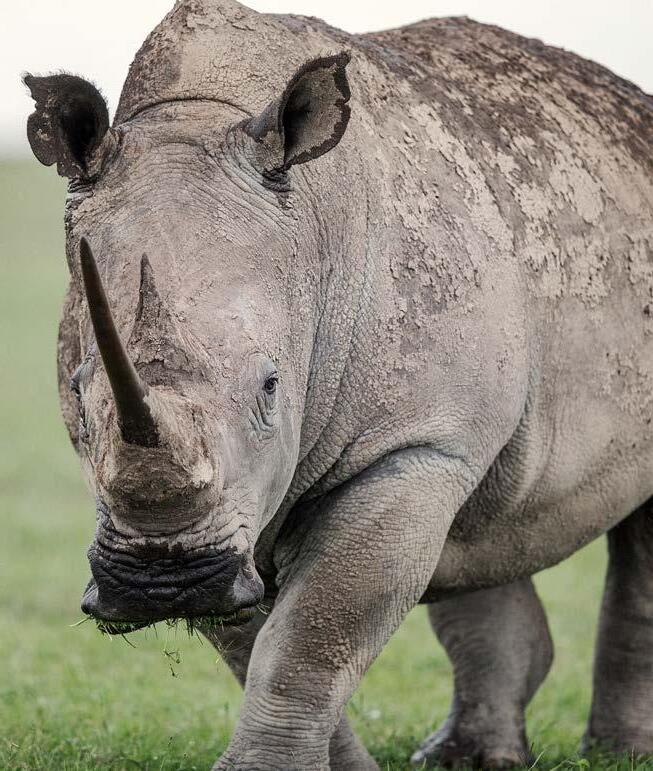
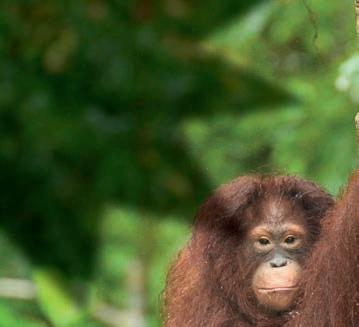
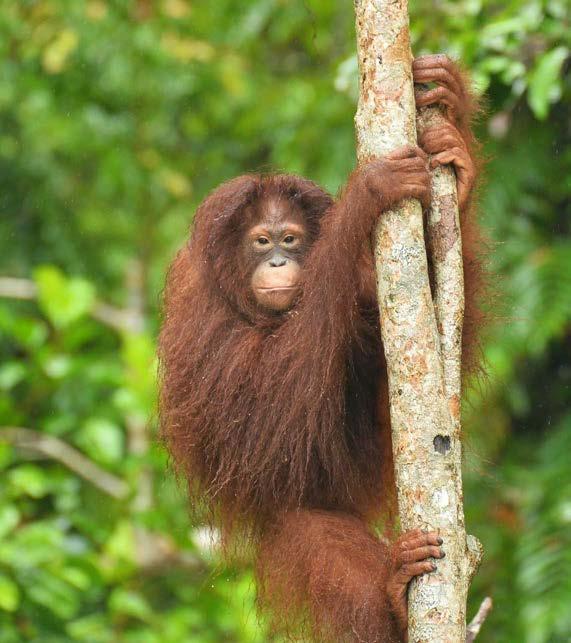
Born Free will:
Campaign to end exploitation in zoos and circuses.
Campaign against the illegal trade in ape bushmeat and live infants.
Support the conservation of western lowland gorillas in Cameroon, and of other species including chimps.
Support the rescue and long-term care of orphan chimps and gorillas in world-class sanctuaries.
Support the rescue of and rehabilitation to the wild of orphan monkeys and orangutans.
Support Born Free USA’s work rescuing and caring for monkeys rescued from roadside zoos, private homes, or animal experimentation.


Born Free will:
Born Free has always been ambitious!
We understand the challenges facing people and wildlife today. With your support, we’ll hold onto our dream of a more compassionate world.
Our 2030 vision is one where wild animals are respected for their intrinsic value, and wildlife and people live in harmony. So, over the next five years, we’ll take practical, positive steps to end wild animal exploitation and keep wildlife in the wild.


One last question. Are you with us? We think we know the answer!
Celia Nicholls Editor celia@bornfree.org.uk
*Today part of the Sheldrick Wildlife Trust, a pioneering conservation organisation.



Campaign to end the illegal trade in pangolin scales and meat, and fight pangolin-related wildlife crime.
Help rescue and care for pangolin orphans confiscated from illegal trade.
Support the rehabilitation of orphan pangolins back to the wild and monitor them once released.
Support habitat conservation in Africa and Asia, home to important pangolin populations.


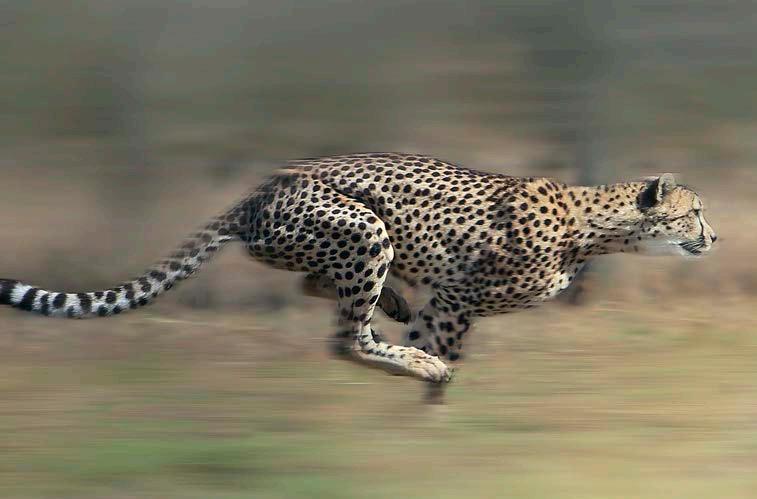
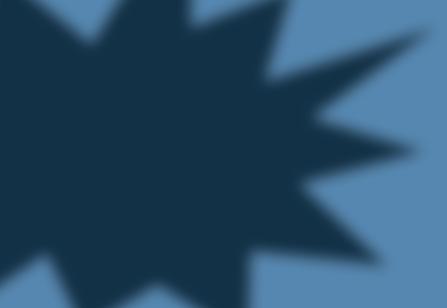


Thank you for sharing our dream of a kinder, better world. With your loyal and generous support, Born Free can continue to be a voice for wild animals in need. Thank you, on behalf of wildlife around the world, for being part of our family!

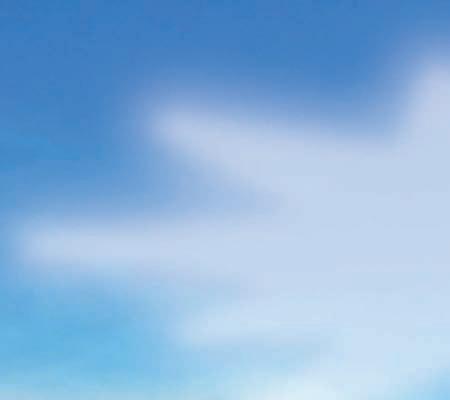



HOW WILL CHANGE HAPPEN? The exploitation, suffering, and killing of wild animals needs to end.

Engaging and empowering communities and people through education and support.

Directly contributing to the delivery of wild animal rescue, care, protection, and conservation.
Wild animals, habitats, and ecosystems need to be protected. 1 1 2 3 4 1 2 3 4
Supporting local people to coexist harmoniously alongside thriving wildlife populations.
Safeguarding the welfare and reducing the presence of wild animals in captivity.


Improving wildlife law and policy development, enhancement, and enforcement.

Working in partnership with organisations that enhance our shared impact.
Returning individual healthy animals to the wild, where possible.

Encouraging communities, organisations, and governments to make choices that protect the welfare of wildlife and their natural habitats.



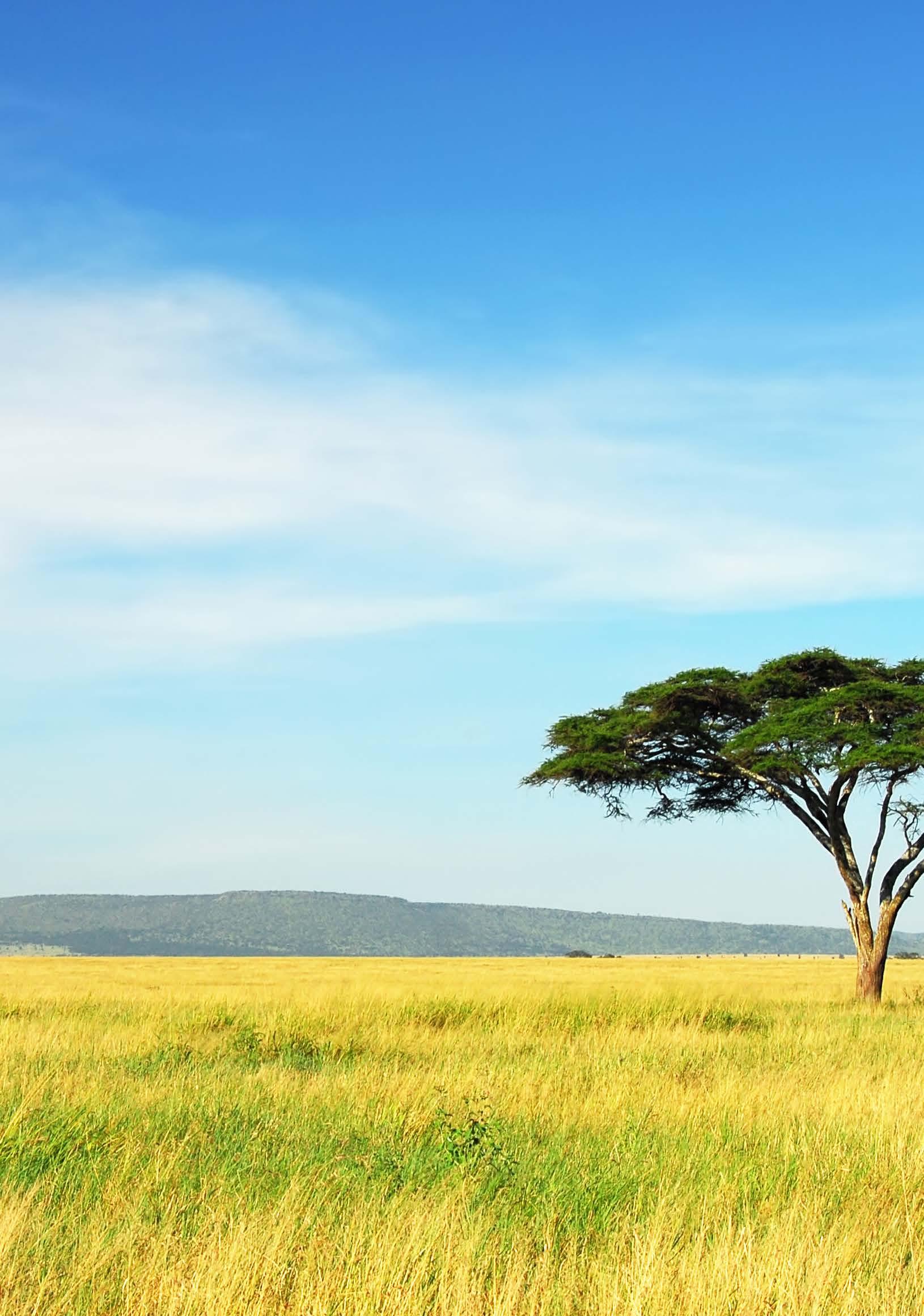

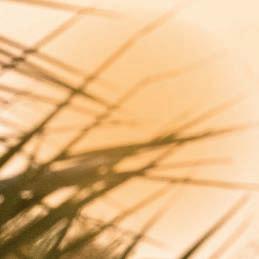



We’ll equip more people to coexist with wildlife, with creative solutions – such as beehive fences (below), or reinforced enclosures and flashing lights to protect livestock from lions.
With our Community Engagement team (page 26) we’ll help more local people – with healthcare, school lessons, savings clubs, sustainable living and more. Even sport!

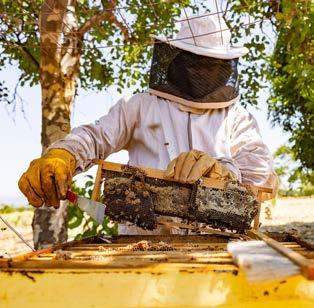
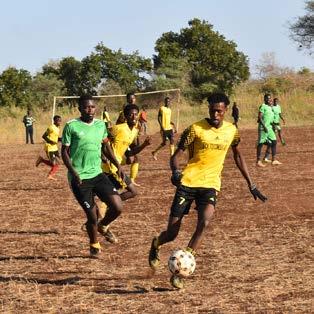
We’ll train and equip more people to protect and restore forests, by planting native trees and other seedlings – including eco-friendly food and cash crops.
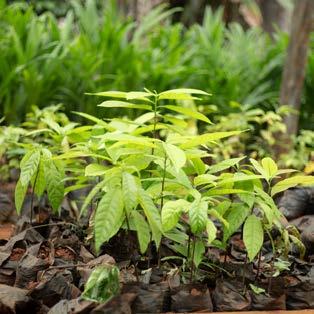
How do you best protect threatened species in the wild? People hold the answer and you, as well as our colleagues and locals, are all key, explains Dr Nikki Tagg.
As Born Free’s Head of Conservation, I’m simultaneously fascinated by the wonder of the natural world, and shocked at how rapidly we’re losing wildlife and habitats. For six years I’ve been honoured to work with Born Free’s passionate, 47-person Conservation team.
Here, with your support, we’re having a big positive impact for wildlife and people in this changing world. We work hard to keep up with these changes and ensure wildlife doesn’t lose out. But, what happens next?
Well, we’ve been busy developing ambitious plans for the next five years!
For more than 40 years, Born Free has fought to end the exploitation of wild
animals, and to protect wild animals, habitats, ecosystems – by supporting the communities who share these landscapes. These goals remain at the heart of our new Pathways to Freedom strategy.
We’ve had many successes over the years. But we want to do much more! Now, thanks to our new five-year plan, Born Free has cemented our future, onthe-ground, Conservation team priorities.
Our Conservation mission
So, what do we do as a team?
We deliver long-term, holistic programmes to engage and empower local communities. These people live in important wildlife habitats close to protected areas, and we enable them to become conservation leaders.
To guide and evaluate our work, we’ll use more tracking devices to identify and monitor individual wild animals – not least when they’re close to people.
We’ll develop even more effective collaborations, working alongside like-minded organisations and expert individuals committed to nature’s recovery.

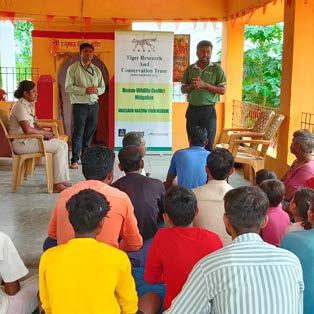
In these places (find out more overleaf), competition for resources, ‘conflict’ and hunting can be a big problem. For example:
• People gather firewood from protected forests in Satpuda Landscape, India. But, this destroys tiger habitat and endangers people.
• Deadly wire snares are set to trap and kill ‘bushmeat’ in Meru National Park, Kenya. But, these are a big threat to long-legged giraffes.
So, we want to create conditions that do even more to help communities reduce pressures on nature, develop sustainable livelihoods, and promote a positive coexistence with wild animals. This will help people and wildlife live safely and thrive alongside each other.
We’ll recruit local people to build support for wildlife law, and develop solutions to remove threats to habitats and wild animals, such as poaching and firewood collection. Using

Which animals & where?
You can find out more on page 16.
But, with your support, we’ll focus on several primary species and priority geographies, particularly elephants, giraffes and lions in Kenya, tigers in India and gorillas in Cameroon.
These key species will be our Conservation team’s priority. But, we’ll continue to invest in protecting other species particularly at threat in our target landscapes. For example:
• The world’s most trafficked mammal, the pangolin, is threatened across all our target landscapes and desperately needs our help.
•Hyenas are embroiled in considerable conflict in Kenya, so they’ll be included in our holistic landscape-scale approach.
Why so few key species?
Our focus is strategic. By protecting these large and wide-ranging ‘keystone species’, and their habitats, we protect whole ecosystems full of other species too!
For example, our primary species in Cameroon is the gorilla. But, the Dja Landscape rainforests are also home to rare chimpanzees, forest elephants, leopards, pangolins and thousands more animal and plant species. Fantastic!
Our new strategy identifies the overarching threats we feel well-placed to address. We’ll put into action the most effective ‘mechanisms of change’. With your support, we’ll make a tangible and quantifiable difference.
Our future vision? Join us!
Our Conservation team aims to develop opportunities to allow people to live positively, alongside thriving wildlife populations. We’ll help communities, local groups, and governments make informed choices to protect wild animals and their habitats.
We have longer-term ambitions too, keeping an eye on and tackling emerging threats to wildlife and challenges for people. For example, protecting habitats from fire or overgrazing, developing community livelihood diversification, and climatesmart, wildlife-friendly agriculture.
But, you can be assured, whatever direction we take, our methods will be holistic, compassionate and cutting edge. So please, join us! Be part of our Conservation team’s journey into the next five years and beyond. You can help ensure our vision of a world where wildlife is respected, protected, and kept in the wild.
Dr Nikki Tagg Head of Conservation nikkit@bornfree.org.uk
International Tiger Day 1.30pm Tuesday 29th July
Love tigers? Inspired that, since our life-changing work began in India in 2004, tiger numbers have more than doubled* to 3,600+? Our team is hosting a webinar, and you’re invited! To find out more visit bornfree.org.uk/events



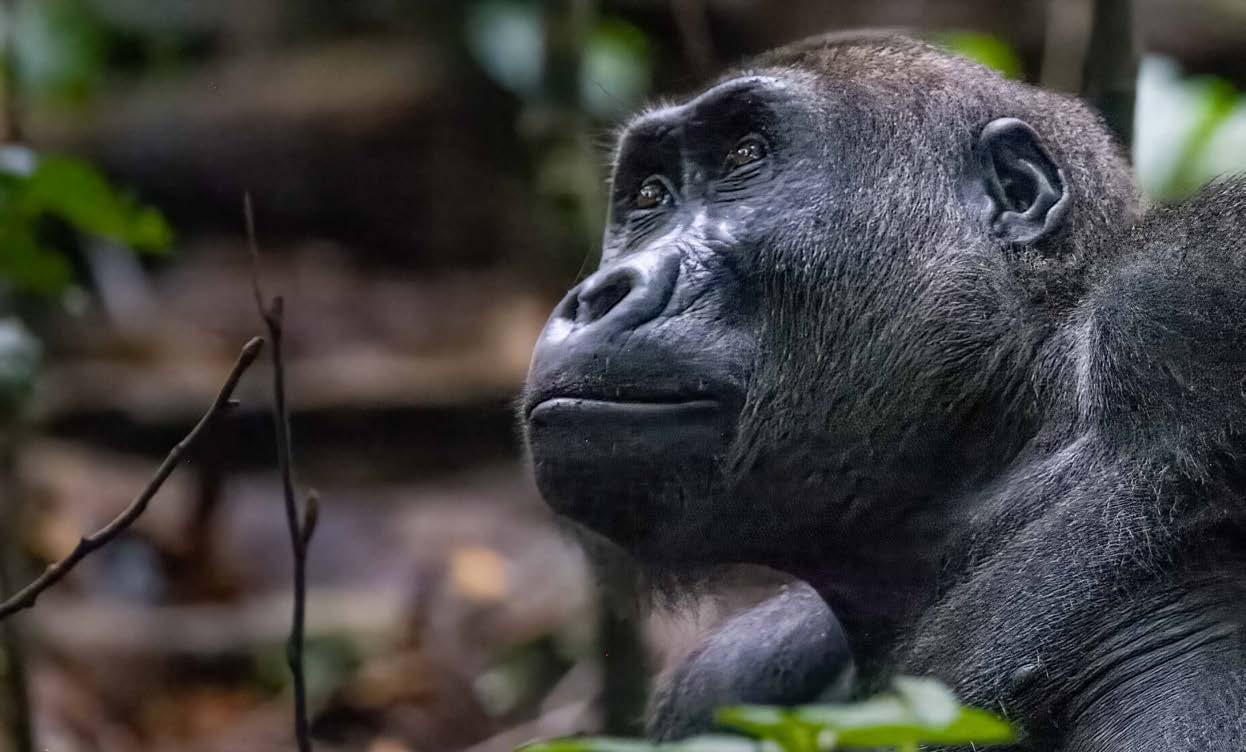

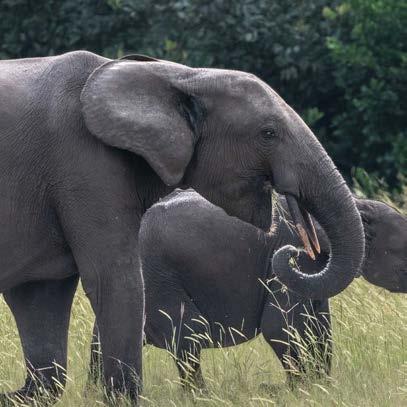


Did you know we employ over 40 people in Kenya? But why spend so much money and effort on conservation and communities there? Michael Mugo reports.
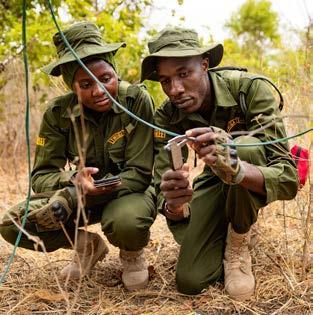
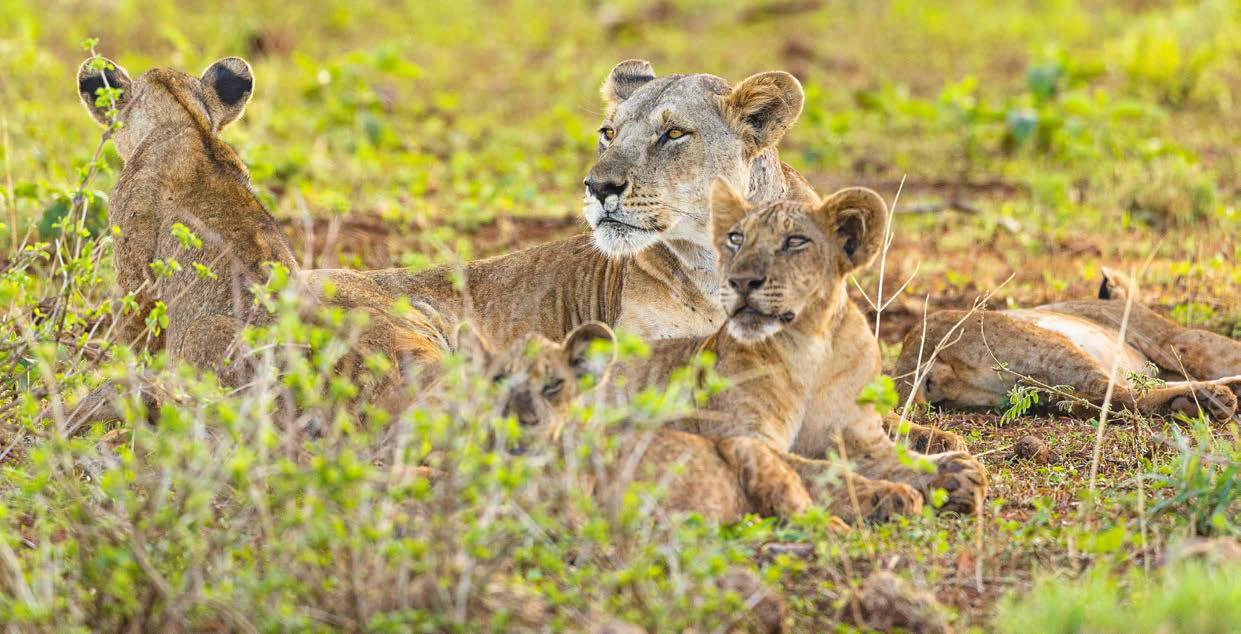
Why do we call Kenya Born Free’s homeland? To me, my country is the soul of our charity.
Kenya is home to the inspiring true story of Elsa the lioness, and her return to the wild by George and Joy Adamson, in the complete wilderness of Meru National Park. There’s something special about the connection between Born Free and the rich flora, fauna, and people of Kenya. The unique relationship gives me hope. It is inspiring, uplifting, deeply connecting, and extraordinarily spiritual.
Born Free has a unique ethos defined by ‘compassionate conservation’. It’s an ethos I find exceptional. Compassionate conservation is in sync with nature and people, fostering respect for wildlife and promoting the value of coexistence.
Born Free also values and respects people. We have a large team of 42 men and women in Kenya, from all over the country. We operate in many different roles – from our office in Nairobi, to fieldwork in Meru as well as Amboseli National Park.
We employ Community Conservation Ambassadors from within conflictstricken communities. We have a highly-skilled Twiga* Team, which
conducts patrols in Meru, removing hundreds of lethal snares (page 34).
This work would not be possible without your support, and strong partnerships with many conservation and government partners. These include Kenya Wildlife Service, whose excellent work over the decades has ensured wildlife has a fighting chance.
Our charity’s connection to Kenya has created a hunger for knowledge in me, about conservation and the broader phenomena that is Born Free. With you by our side, our remarkable history and visionary dedication will guide our mission of wildlife conservation and protection. Both here, in Kenya, and across the world.
Michael Mugo
Pride of Meru Manager
Born
Free Kenya
*Swahili for giraffe
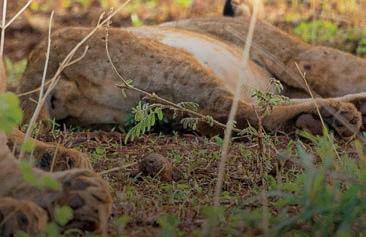
When the film Born Free was made in Kenya in 1964, the human population was nine million. Today it’s over 56 million. And yet, with our help, elephants have more than doubled (since 1989), lions are up 25% (since 2010), and rhinos are up 89% (since 2014)*. We must be doing something right!
*Based on Kenya Wildlife Service figures
“Born Free has been a valuable partner to Kenya Wildlife Service. You support key conservation initiatives. These efforts have significantly improved people’s tolerance, and fostered greater coexistence between wildlife and local communities.”
Paul Wambi
Assistant Director, Kenya Wildlife Service




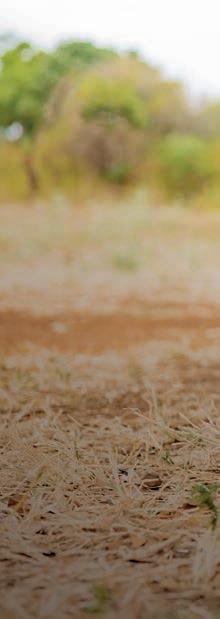
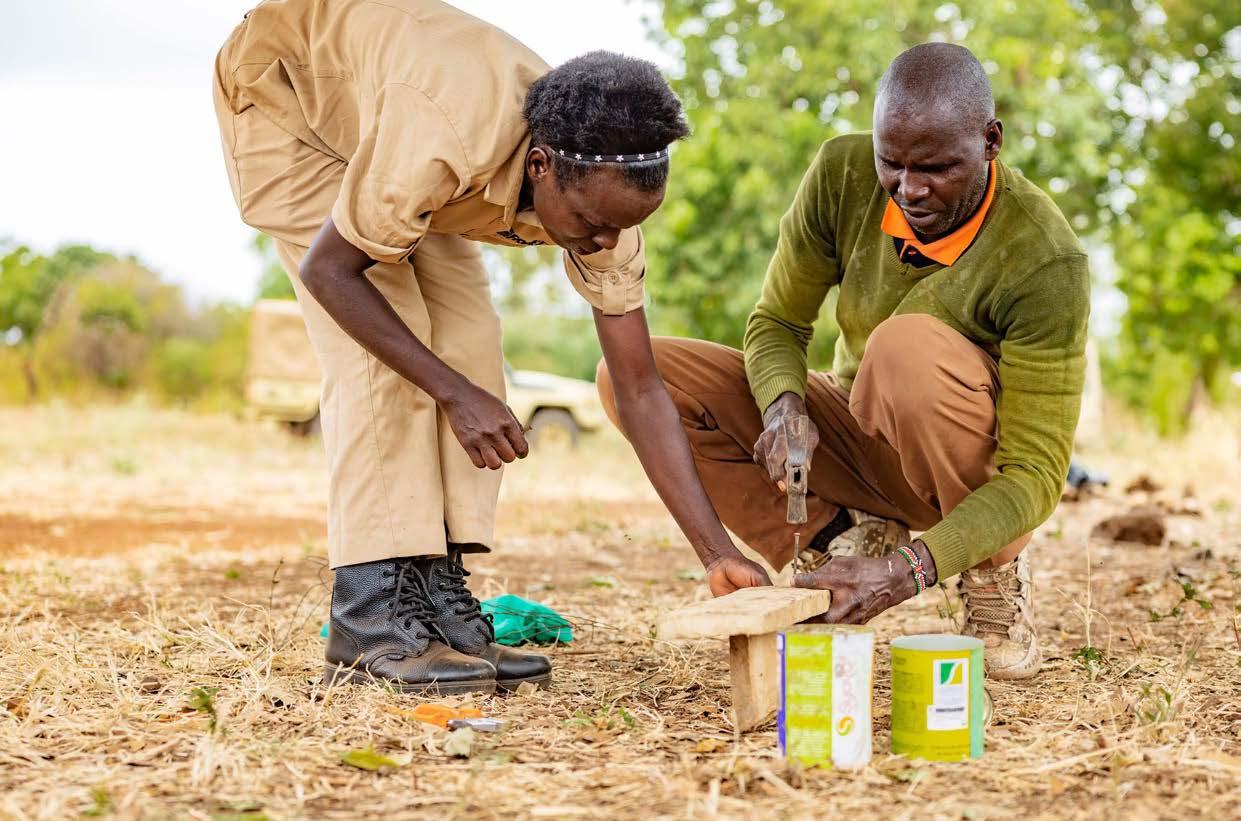




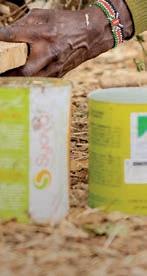
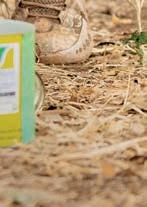
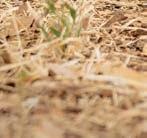
How can we bring about the change we want for wild animals? Always remember, people are pivotal, says Laura Eastwood. We already inspire tens of thousands, but want to do so much more.
Born Free has long had two clear aims: to end wild animal exploitation, and to protect species in the wild. But how do we do this? Working with local communities is key.
I’m passionate about wildlife so, as Head of Born Free’s newly-rebranded Community Engagement team, I’m devoted to creating real changes in our relationship with nature. With your help, our amazing ten-person team (spread across four countries) is working hard to create a better world for people and wild animals. We’re so excited what the next five years will hold.
Local communities are the stakeholders and guardians of the natural world. Without involving people, any efforts to protect wildlife habitats or end poor practices are
unlikely to gain traction. This is why our ‘Education team’ is evolving! Education is integral to what we do but, to better reflect our expansive work, we’re excited to unveil our new Community Engagement programme.
Where are we now?
Our team has already made huge strides. Over the last year, we’ve directly:
•Reached hundreds of teachers and thousands of students in the UK, Kenya, Ethiopia and South Africa
• Benefitted tens of thousands of local community members.
But that’s just for starters! Since 2017, our extensive, free tes.com resources have been downloaded nearly 200,000 times by teachers from across six continents. We’re genuinely helping create a global generation of
wildlife-friendly and conservationminded young people.
Looking to the future
We want to do far more, and have detailed plans to help communities:
1. Reduce people’s reliance on natural resources and increase resilience to climate change
2. Prevent the exploitation of wild animals
3. Promote coexistence – people and wildlife in harmony.
Over the next five years our team will be creating much deeper connections with local communities and building them into our programmes, as well as interacting far more with teachers – not least school heads. Our long-term vision aims to simultaneously address the needs of a range of communities, as we undertake our formidable conservation and animal welfare-related goals.

At Born Free we use this term broadly, to describe any group of people – students, teachers, or local and indigenous communities – living alongside threatened wildlife.
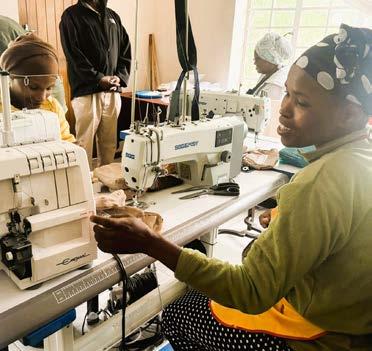
So, next time you hear us mention projects like school conservation clubs, water protection projects, tree planting, waste collection, or Village Savings and Loans Associations*, consider the huge impact we’ll have by integrating these human-focused projects into our wider work. With your support, we’ll ensure the communities we rely on to help achieve our wildlife goals are in the best position to do so.
Laura Eastwood Head of Community Engagement laura@bornfree.org.uk
*See bornfree.org.uk to find out more
Do teachers know and appreciate the negative impact captivity can have on wild animals? Do they understand the limited conservation value of zoos? With so much promotional output from these facilities, perhaps not! By working with teachers, we can ensure a more balanced view is taught.
To find out more visit bornfree.org.uk/uk-education
Want the young people in your life to learn more about wildlife, Born Free projects, and how small actions can help animals? Sign them up to our FREE monthly Hear the Roar XL emails here: www.bornfree.org.uk/ kids-club/
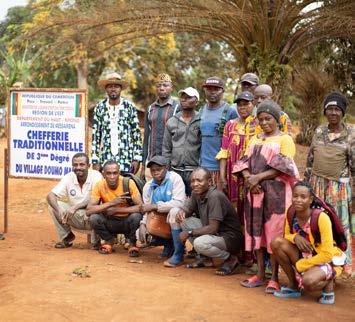
“The women’s livelihood project changed my life. We create gift bags for sale at Shamwari (page 29). Now, as a single mother, I can buy food, clothes and school items. I also learn about the environment from Born Free staff.”
Andiswa Arthurlia Mfeku Lavelikhwezi Empowerment Project South Africa
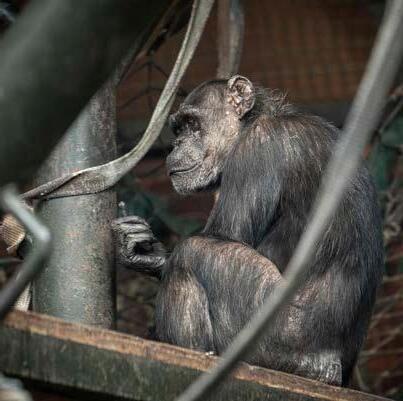

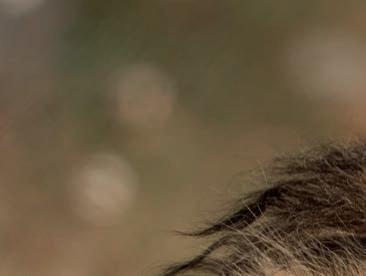



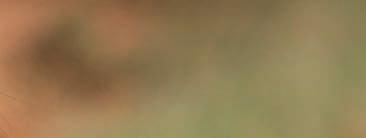
Every animal is unique and deserves a life free from harm. Which is why rescue and the best possible care is at the heart of our charity. Maggie Balaskas reports.

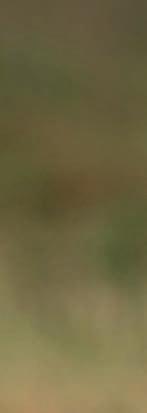
Our charity has two big goals: to end wild animal exploitation and protect species in the wild. But how will the change we want, happen? Rescue and care has a key role!
As Born Free’s Head of Rescue and Care, I’m – like you – in awe of the incredible wildlife we share our planet with. From iconic species gracing African and Asian landscapes – big cats, elephants and great apes – to goldfinches, hedgehogs and even whales, here in the UK.
For seven years, I’ve worked with a remarkable, hardworking team making positive change for animals. We protect species in the wild, and provide rescued individuals with the best possible care and a second chance – even if they can’t be released.
Please know, this is only possible with your help. We have ambitious plans for the next five years. I hope you’ll stand alongside us, as we keep wild animals where they belong –in the wild.
Individual animals have always been at Born Free’s heart. We tirelessly seek to end global exploitation in zoos, circuses, or for the pet trade. So you’ll be happy to hear this is at the centre of our strategy for the next five years and beyond. Sadly, there’s no ‘quick fix’. But through the core pillars of our work, and collaborations with other like-minded organisations, we can overcome the odds and make positive, lasting change.
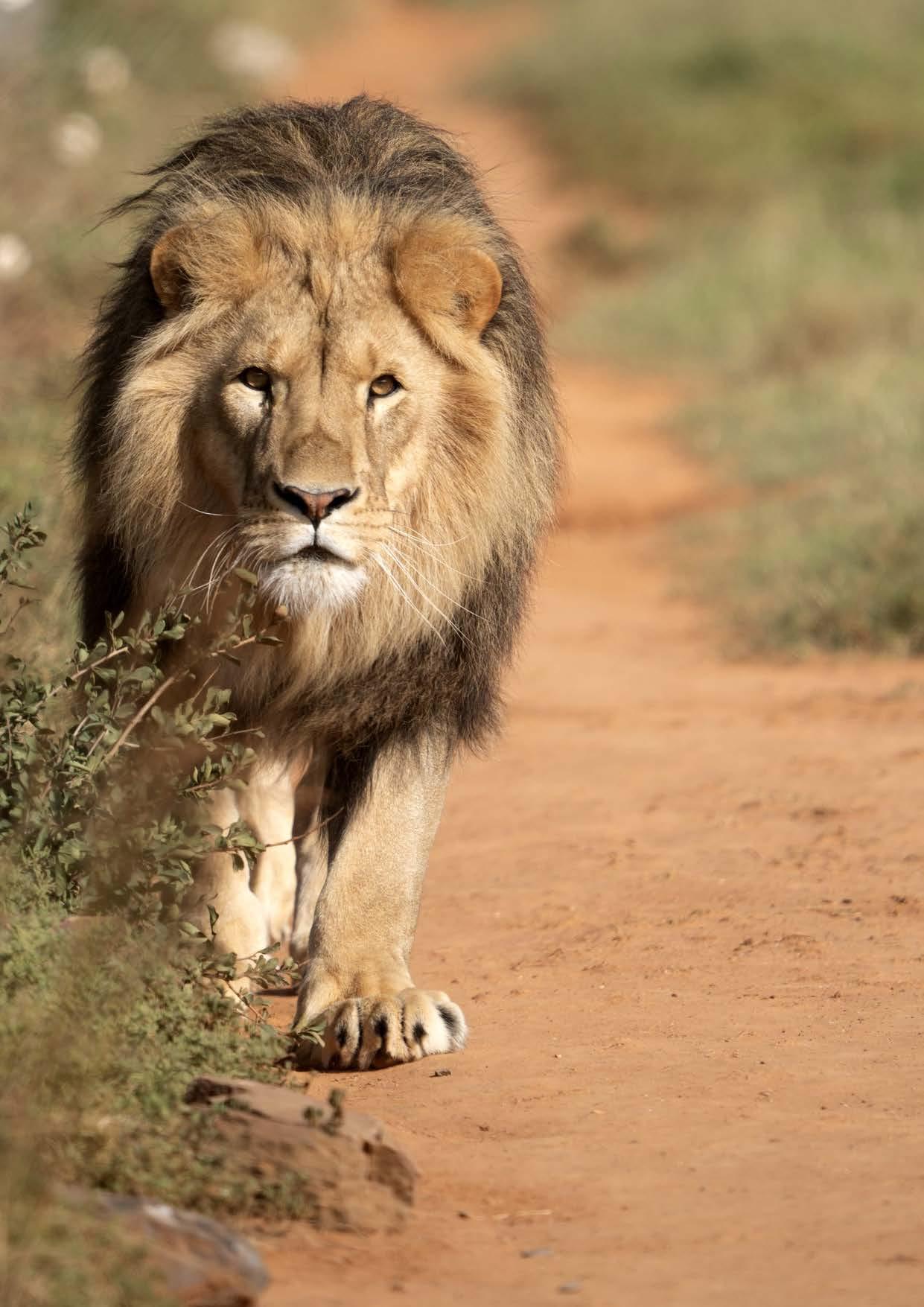

Rescue allows us to transform the lives of individuals who suffer in captivity, are victims of wildlife trafficking, or injured and orphaned in the wild (often as a result of human activity).
Our hard-working team in Ethiopia is at the forefront, working alongside the Ethiopian Wildlife Conservation Authority and caring for a wide range of species, from cheetahs to hyenas. In urgent situations, we provide expert care, not least for animals confiscated from illegal trade. Without our Ensessa Kotteh sanctuary, opened in 2011, there would be nowhere for these animals to go. Fewer would be confiscated, or they may be held for years in a police station, or end up in unthinkable conditions in a zoo.
Our work extends across the world. Wherever we can, we coordinate and fund rescues or relocations, and provide lifelong homes in our sanctuaries, or those of our trusted partners.
In Europe alone, we have helped to transform the lives of thousands of rescued animals, from tigers to dolphins, bears to badgers. Born Free takes the lead or supports other incredible organisations, not least rescue centres here in the UK, rehabilitating species to the wild whenever possible.
But, providing lifetime care is another crucial part of our work. As you can imagine, space for rescued animals, not least big cats, in genuine sanctuaries is in incredibly high demand. Which makes finding homes a challenge. Through our invaluable partnership with Shamwari
Private Game Reserve and your generous support, we operate a Global Federation of Animal Sanctuaries’ accredited sanctuary in South Africa. Here, since 1997, we’ve rehomed 52 lions and leopards – transforming their lives.
“Some cats were treated badly and need special care due to their traumatic, painful past,” explains our Animal Care Assistant Martin Miritiawo. “It’s fantastic that I can contribute to their care and see how they grow stronger.”
Arriving at Shamwari may be the first time many cats feel grass under their paws – having been confined to circus trailers, or cramped cages with concrete floors. Now they feel sunlight on their faces and breathe fresh air, with Africa’s wild scents and sounds around them. These ‘simple things’ help rescued cats move beyond past traumas and live a contented life. That, and expert care!
We currently look after nearly 200 lions, tigers, leopards, primates and many more, at world-class sanctuaries – two operated by Born Free and three by our partners. By telling their stories, each animal can be an ambassador for others in need and, we hope, a clear demonstration of the difference we make, and an inspiration, showing what can be achieved when we work together.
In the next five years we want:
To release more rescued animals back to the wild
To rescue and rehome even more animals, in collaboration with trusted partners and rescue centres
The UK government to begin phasing-out big cats in zoos (ban breeding, stop imports from other zoos/the wild, and prioritise welfare), meaning more cats need rehoming in sanctuaries.
Long-term dream:
Wild animals are no longer exploited for entertainment
Sanctuaries for animals rescued from captivity become obsolete.
Big Cat Sanctuary, Shamwari, South Africa
Ensessa Kotteh, Ethiopia
“I’ve been looking after rescued leopards and lions at Shamwari for 25 years. We see the cats transform, but first have to win them over to trust humans, after their horrible start to life. Spending time with these beautiful creatures changes you –how you see wild animals and why you need to protect themin their natural spaces.”
Glen Vena Born Free Animal Care Manager,
Shamwari
Maggie Balaskas Head of Rescue & Care maggie@bornfree.org.uk

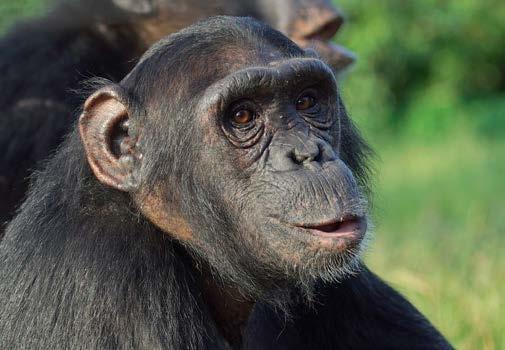
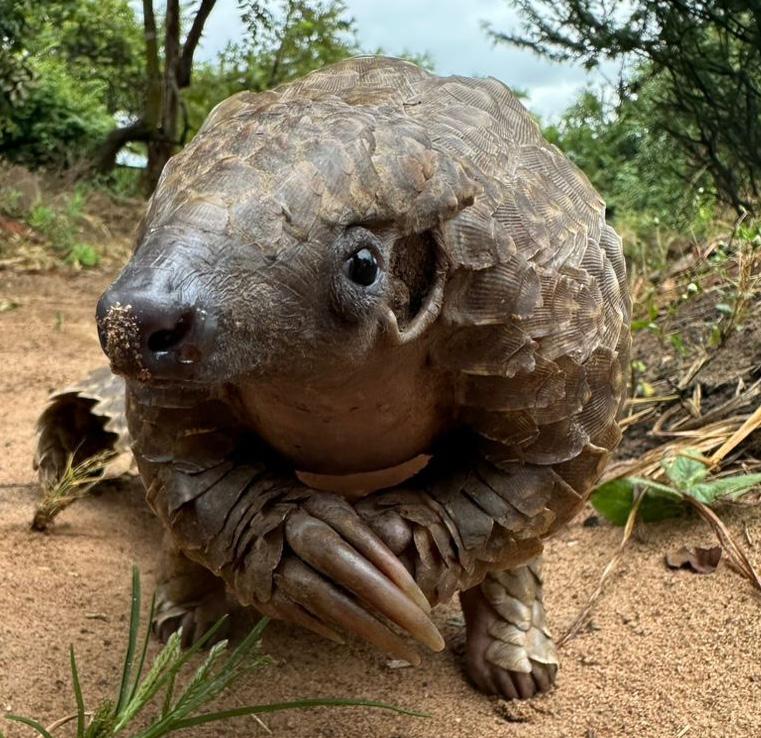
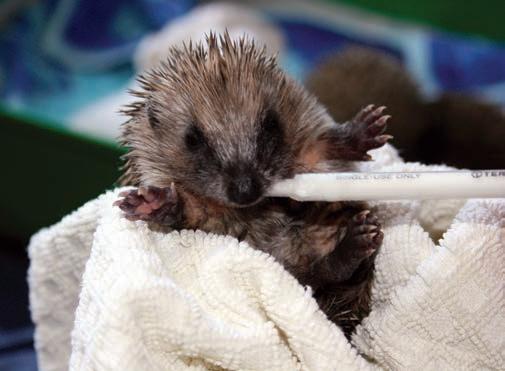


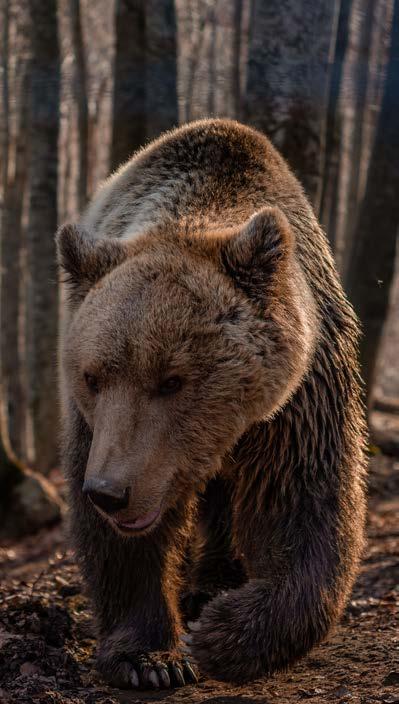
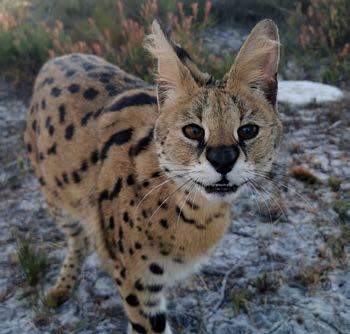
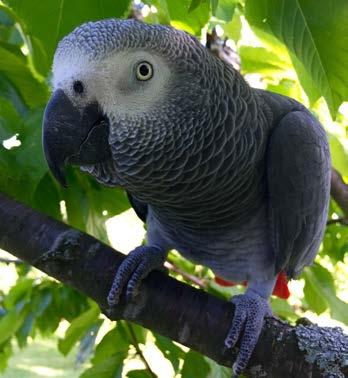

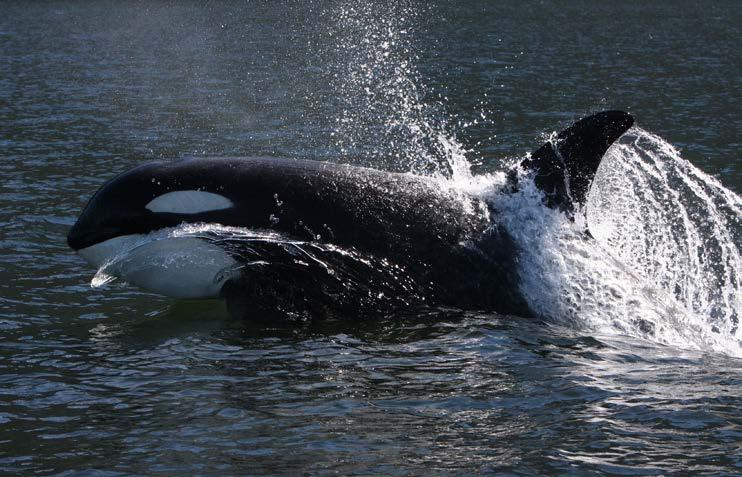
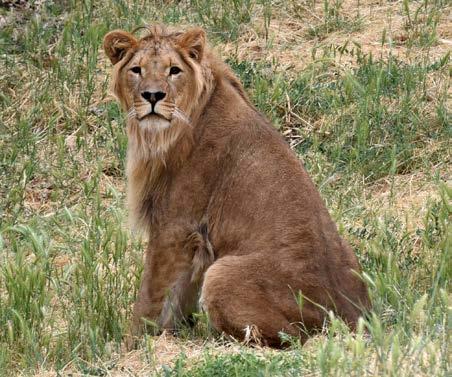
“Rescued as a sickly cub from illegal trade, Simba has transformed into an amazing, majestic lion. When he arrived in 2022, he was shy and uncertain, his mane just beginning to grow. Today, he’s in top condition, sleek, powerful and a picture of confidence — regal yet playful. His energy is boundless. He’s become the lion he was always meant to be.”
Lisa Russo
Lead For Overseas Projects
Animanatura Wild Sanctuary Home to Simba the lion, rehomed with your help

With limited resources, how can we care for the maximum animals? By helping other centres to rescue, look after and return to the wild a myriad of species! Dr Andrea Donaldson reports.
With your support, we want to help as many animals in need as we can. So, alongside Born Free’s own flagship projects, we work with ‘partner sanctuaries’ and other like-minded organisations.
First our partners. Remember Simba the lion and Sandro the tiger? There’s a big need for more homes for rescued cats but sadly, this need far outweighs the number of high-quality enclosures Born Free actually has. So, whenever possible, our incredible partners offer space when we don’t have room. They run the sanctuaries, but share our ethics and vision, while we help fund lifetime care for ‘our’ cats and the creation of purpose-built enclosures.
And other species? From pangolins to gorillas, grey parrots to badgers, our grants help other organisations care for a range of wildlife. These ‘supported projects’ do valuable work which aligns with our strategy, even if we don’t have capacity to conduct the work ourselves.
At each project, the welfare of every individual animal is paramount. But, our level of involvement varies, and each project has its own history. For example, Born Free was fundamental in establishing major projects not least:
•Zambia Primate Project
•Lilongwe Wildlife Centre, Malawi
• Ngamba Island Chimpanzee Sanctuary, Uganda
We still support this vital work financially, but aren’t involved in day-today operations.
For other projects, we focus on individual animals or species, such as:
•African grey parrot rehabilitation and lifetime care of Chinoise the chimp, Limbe Wildlife, Cameroon
•Kyriakos the brown bear’s lifetime care, Arcturos, Greece
•Springer the orca, monitored by OrcaLab, Canada, after we helped return her to the wild in 2002
•UK wildlife, such as the rescue, rehabilitation and release of hedgehogs and foxes at rescue centres across the country.
Many of these projects were born out of a need to house wild animals following confiscation from illegal trade. Interestingly, two of them – Limbe and Lilongwe Wildlife Centres – are former zoos, transformed into genuine sanctuaries (Lilongwe with our help).
All have grown over time to encompass programmes seeking to prevent the need for rescue. This includes education outreach,
community support, conservation, and supporting the wildlife law enforcement activities of governments to end illegal trade.
Ultimately, we’re all working towards the dream of peaceful coexistence between people and wildlife. With your kind help, we want a world where sanctuaries are no longer required.
Dr Andrea Donaldson Rescue & Care Officer andrea@bornfree.org.uk
Animanatura Wild Sanctuary, Italy: home to Sandro the tiger, as well as Simba and Elsa the lions
Panthera Africa Big Cat Sanctuary, South Africa: home to Balozi, Lekanya, Kamogelo and Mahaba, the servals
Bannerghatta Tiger Sanctuary, India: home to Gopal the tiger.
Crime – which he founded with Born Free’s help – and former Secretary General of CITES*.
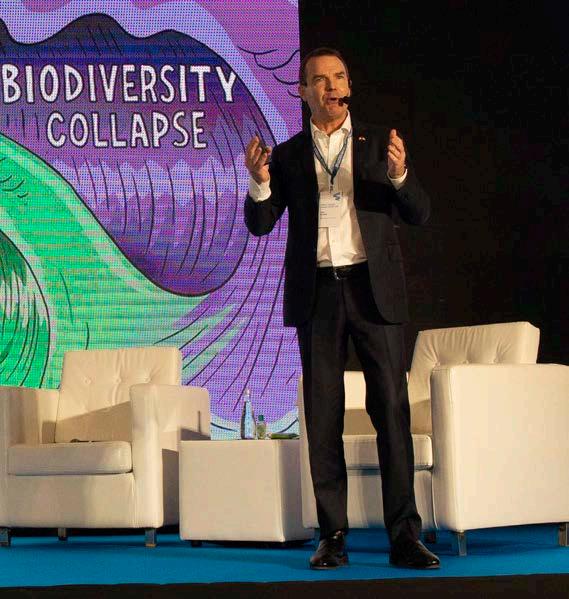
John, your background is in law. What led you to work on wildlife issues?
I grew up in Adelaide and spent a lot of time in the bush with my parents. My mother was from Sweden, and I had the opportunity as a young kid to get into the wonderful forests north of Stockholm. I think that was the start of my great passion for wildlife. When I studied law, I took a new course called environment planning law, and realised I could combine my interest in nature with a career in law. I ended up establishing one of Australia’s first environmental law practices.
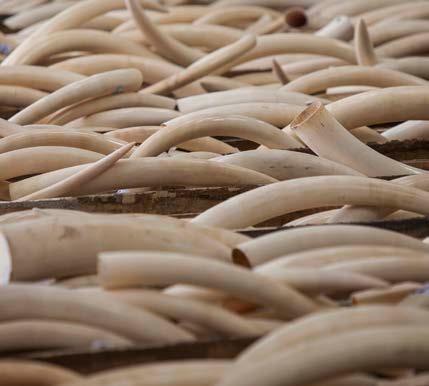
Wildlife is facing multiple threats, one of which is over-exploitation, including through trafficking which is happening at an industrial scale. The impacts are huge. The World Bank estimates wildlife crimes account for $1-2 trillion per year**. Trafficking is leading to ecosystem degradation and species extinctions, with knock-on effects for the health and livelihoods of local communities. This massive issue extends well beyond direct impacts on animals and plants.
I spent eight years as Secretary General of CITES, during which I put a lot of energy into raising awareness of wildlife trafficking and scaling up the global response. While we had a degree of success, I learned that while CITES is a remarkable instrument, it was never designed to combat trafficking. It’s a trade-related, not a crime-related, convention.
In conversation with various colleagues, including Will Travers and yourself, I thought it was time to look beyond
CITES towards a new international legal instrument, if we wanted to really have an impact on wildlife trafficking. We put together the initiative, which Born Free helped launch in 2020 in the House of Lords.
How does improving legislation stop criminals?
To tackle international wildlife trafficking, you have to have access to technology and financing. But fundamentally you need a legislative basis to intervene, and you need that at international, national and sometimes sub national levels. At the moment, there is no global agreement on preventing wildlife trafficking. CITES covers less than 1% of the world’s species, and doesn’t address domestic wildlife trade or illegal harvesting.
An international agreement is needed to set out how we define wildlife crime, how states share information and deal with demand. We also need strong national legislation. If you don’t have a legislative basis, you’ve got no basis upon which to actually use the law to intervene.

It’s grown exponentially and currently has 45 organisationsǂ from across every region and sector. We’ve established effective ways of working with state governments, essential because they make international law. We’ve supported them in ground-breaking resolutions on trafficking adopted by the UN’s Crime Commission, and on environmental crime, adopted by the UN Convention against Transnational Organised Crime.
Lastly, how can Born Free’s supporters help?
Making any international law depends upon state governments, and governments are influenced by what
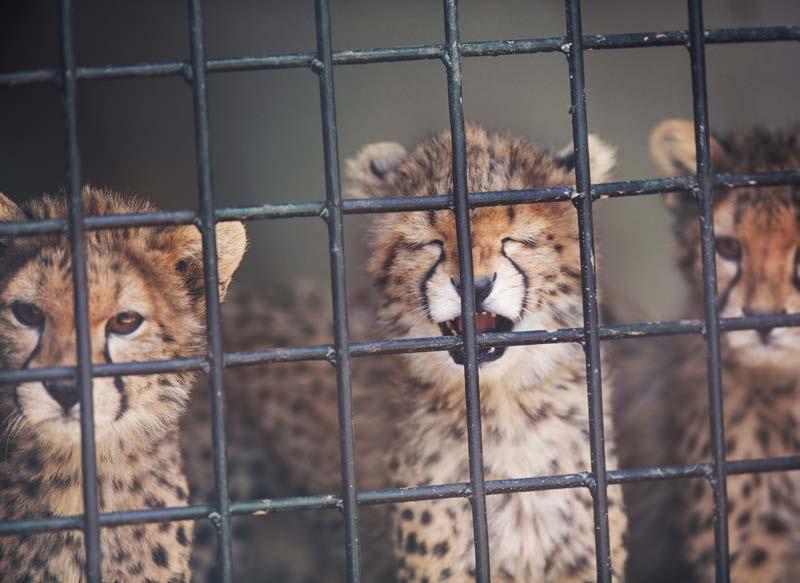
their citizens think. It’s really important to make politicians aware that strengthening the international legal framework to help combat wildlife trafficking is important to their citizens. People need to make themselves heard. So, if you let your local politician know how important this is, it will help.
In May, after years of work from Born Free with our #EndWildlifeCrime colleagues, the Council of Europe adopted a legally binding treaty to help protect wildlife and the wider environment from crime. See bornfree.org.uk/news to find out more.
To read John’s complete interview with Mark visit bornfree.org.uk/news
*The UN Convention on International Trade in Endangered Species of Wild Fauna and Flora, which regulates global trade in threatened wildlife species.
**This includes the negative impacts illegal trade has on ecosystem functioning (including to mitigate climate change).
ǂThese include the World Travel and Tourism Council, the World Oceans Council, the International Rangers Federation, organisations dealing with wood products, the Wildlife Justice Commission, Born Free, and the Wildlife Conservation Society, among many others.
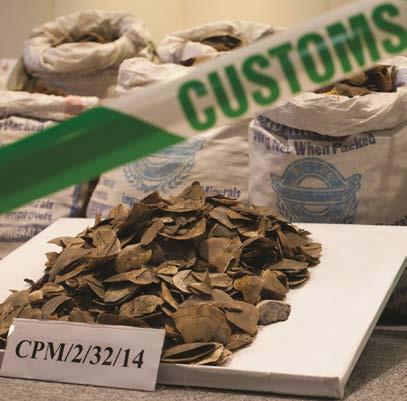














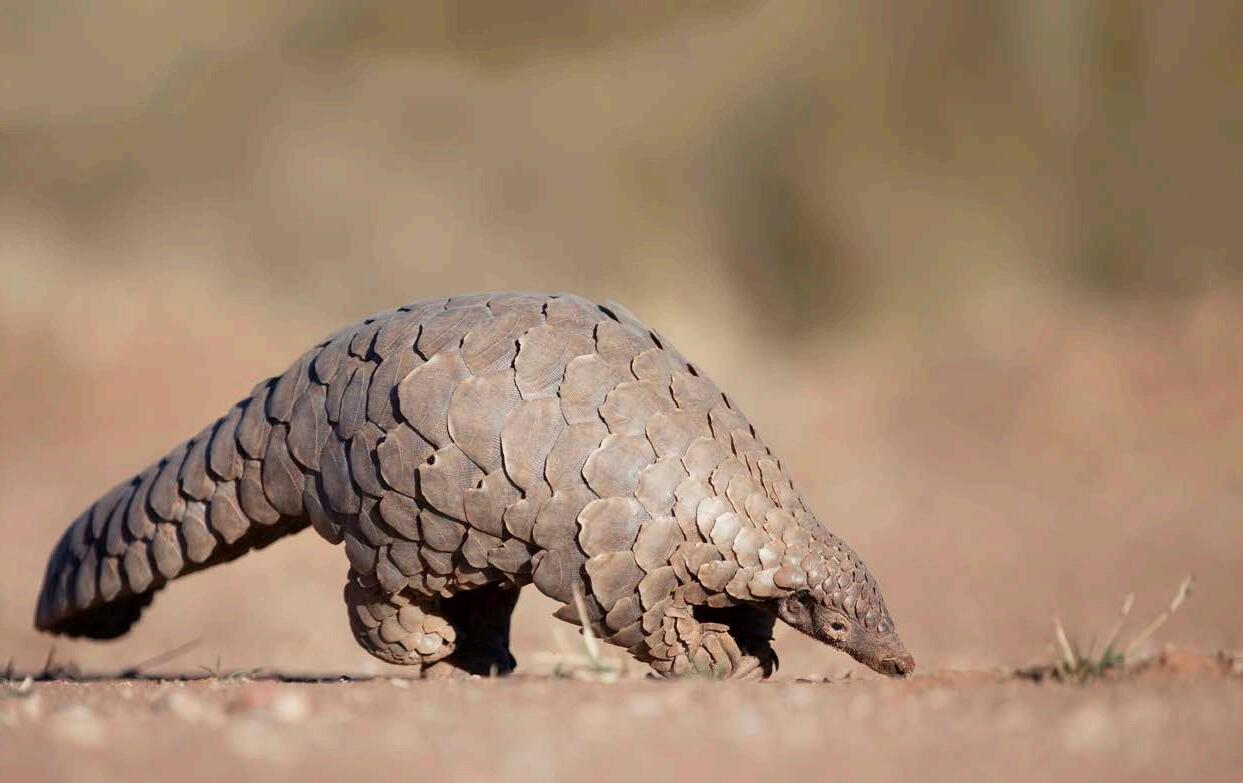

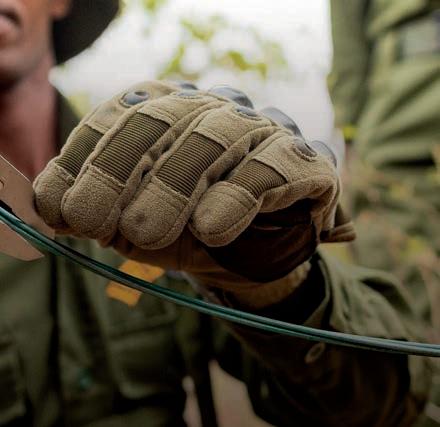
An essential and devoted member of our Twiga* Team, Bernard Njoroge has had a unique journey with Born Free – from farmer to conservationist.
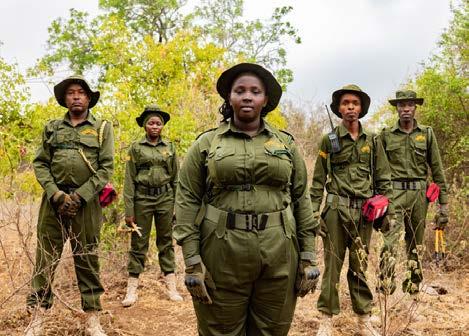

I grew up in the Kanjoo area of Kenya, along Meru National Park’s western boundary. I used to be a farmer, but my Born Free journey began in 2018, at an outreach programme at Kanjoo market.
I was captivated by Born Free’s hard-hitting, but funny, film about bushmeat – which is illegal meat from wild animals. Called Mizoga (‘carcasses’ in Swahili), it showed how poaching can devastate wildlife. It inspired me to join the Twiga Team in 2021.
Our dedicated team of five trained individuals protects wildlife in Meru by eradicating snares and preventing illegal activities. We’re all locals – joining the team was a golden opportunity to contribute to conservation.
We begin as early as 6am and can work long days. We often camp when working in more distant parts of the 340-squaremile park. I’ve helped removed over 1,500 snares – set to entrap wildlife. Giraffes are especially vulnerable, I’m so glad we help protect them. We’ve also helped save several snared lions.

Working with communities is critical to stop snares being laid in the first place. By organising meetings, we raise awareness about the health risks of eating bushmeat (which can spread disease) and why reticulated giraffes matter.

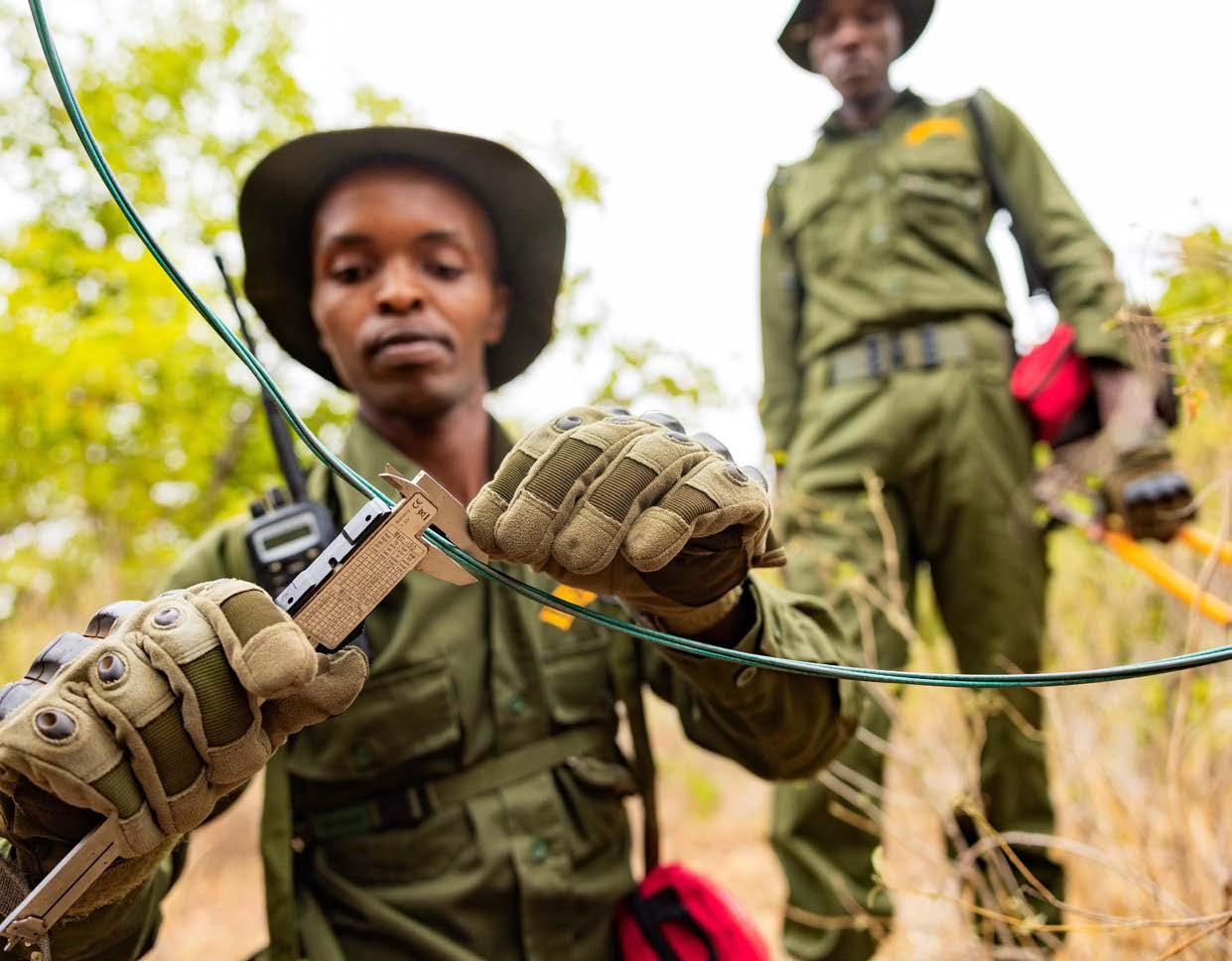
My work helps giraffes and fosters more positive attitudes towards them. Our Saving Meru’s Giants’ Programme Manager, Newton Simiyu, praises our work, but we need to do more. “In the next five years,” said Newton, “Born Free aims to massively reduce snaring and help protect wildlife by securing safe habitats.”
I also look forward to helping my community develop sustainable livelihoods. To reduce reliance on bushmeat we’ll help locals embrace alternative sources of income. Such initiatives can help sustain daily needs and reduce snaring. I’m so proud to be part of the Born Free team.
*Swahili for ‘giraffe’



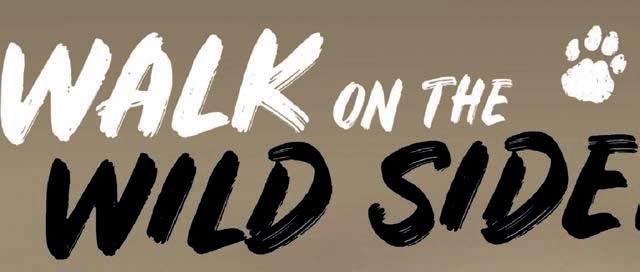
Calling all lion-lovers! Please take 23,000 steps in a single day, to honour the 23,000 lions left in the wild.You can walk, run, or mix it up.


Born Free’s annual stride for lions is free to take part and the perfect way to get outdoors this summer. So, invite your colleagues, friends or family to sponsor you AND join in!
Together, let’s raise vital funds to:
1.Protect lions in the wild
2.Care for rescued lions (we currently look after 22!)
3.Fight captive exploitation
Fundraise to unlock your exclusive rewards:
• Raise £30 to claim your special T-shirt to wear on your wander
•Raise £150 to secure your limitededition Born Free shoelaces
•Raise £230+ (1p for each wild lion) for a Born Free water bottle



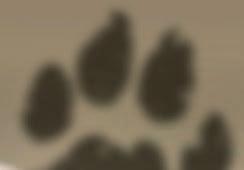









*Do in one day, or spread out during August Wherever you are in the world – join our annual stride for lions!

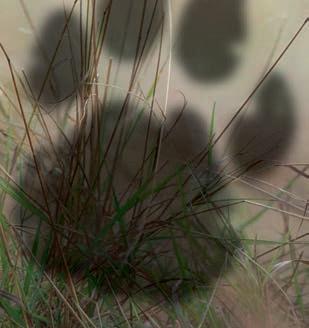


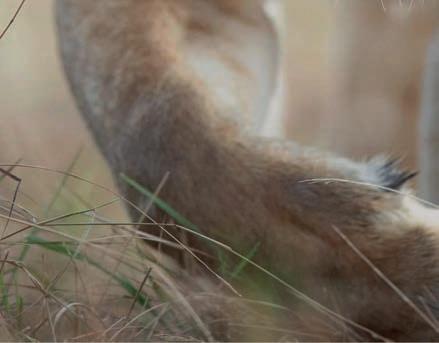
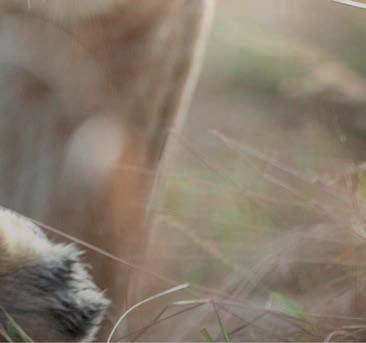

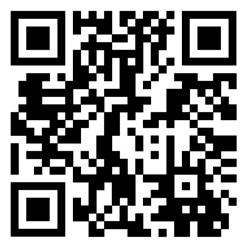


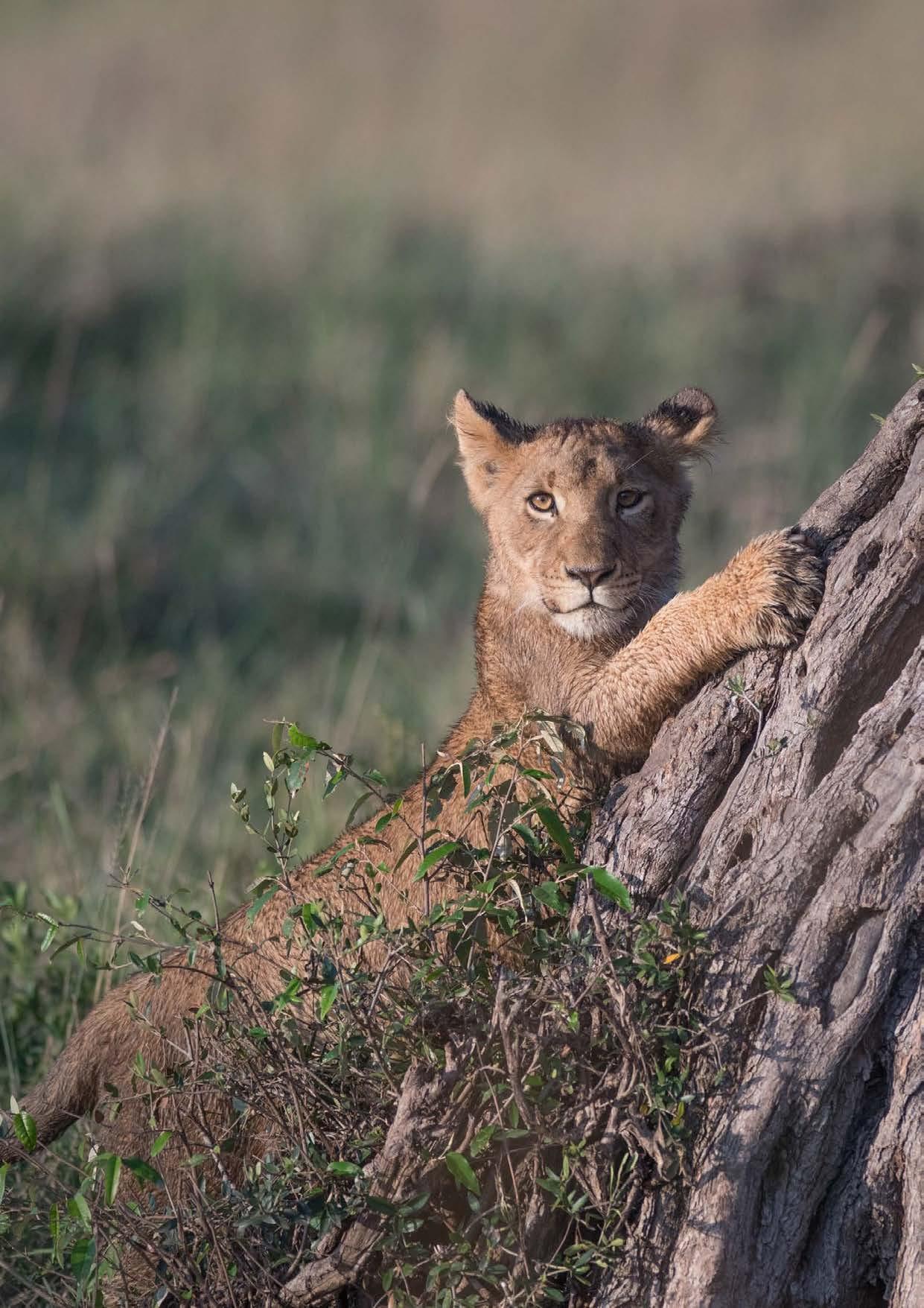



Leaving a gift to Born Free in your Will is an effective way to protect wild animals for future generations. Gifts in Wills are a hugely important part of our charity’s income, funding half our projects.
Your kindness could live on in every animal we rescue, every life we save, and every habitat we keep safe.
Your generous gift, no matter how large or small, can help:
• Rescue and care for individual wild animals in need
• Support conservation of threatened species and their habitats
• Ensure local people can live in harmony with wildlife
• Influence wild animal-friendly policy and legal protections


Keep your memory alive, by keeping wildlife in the wild.





